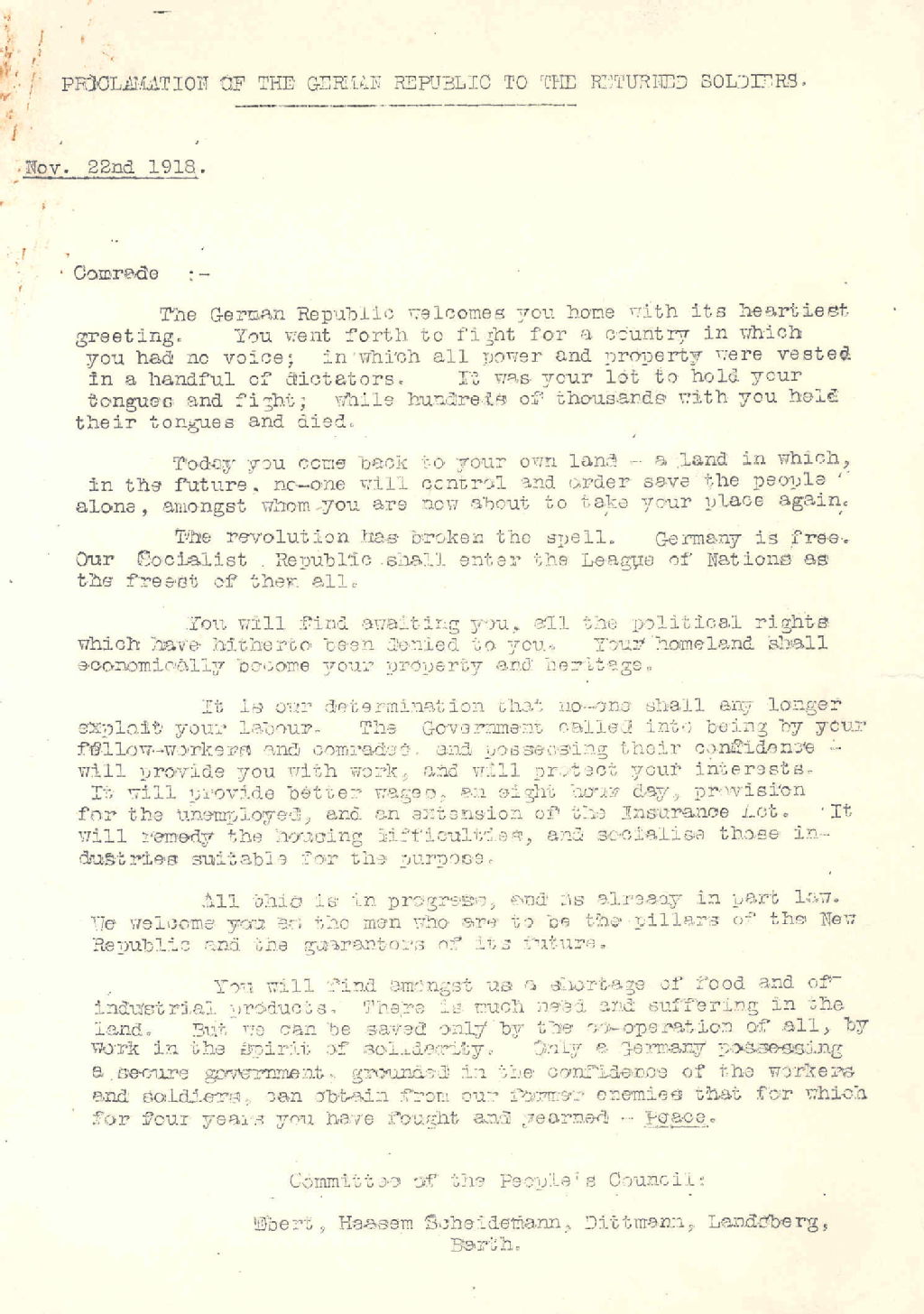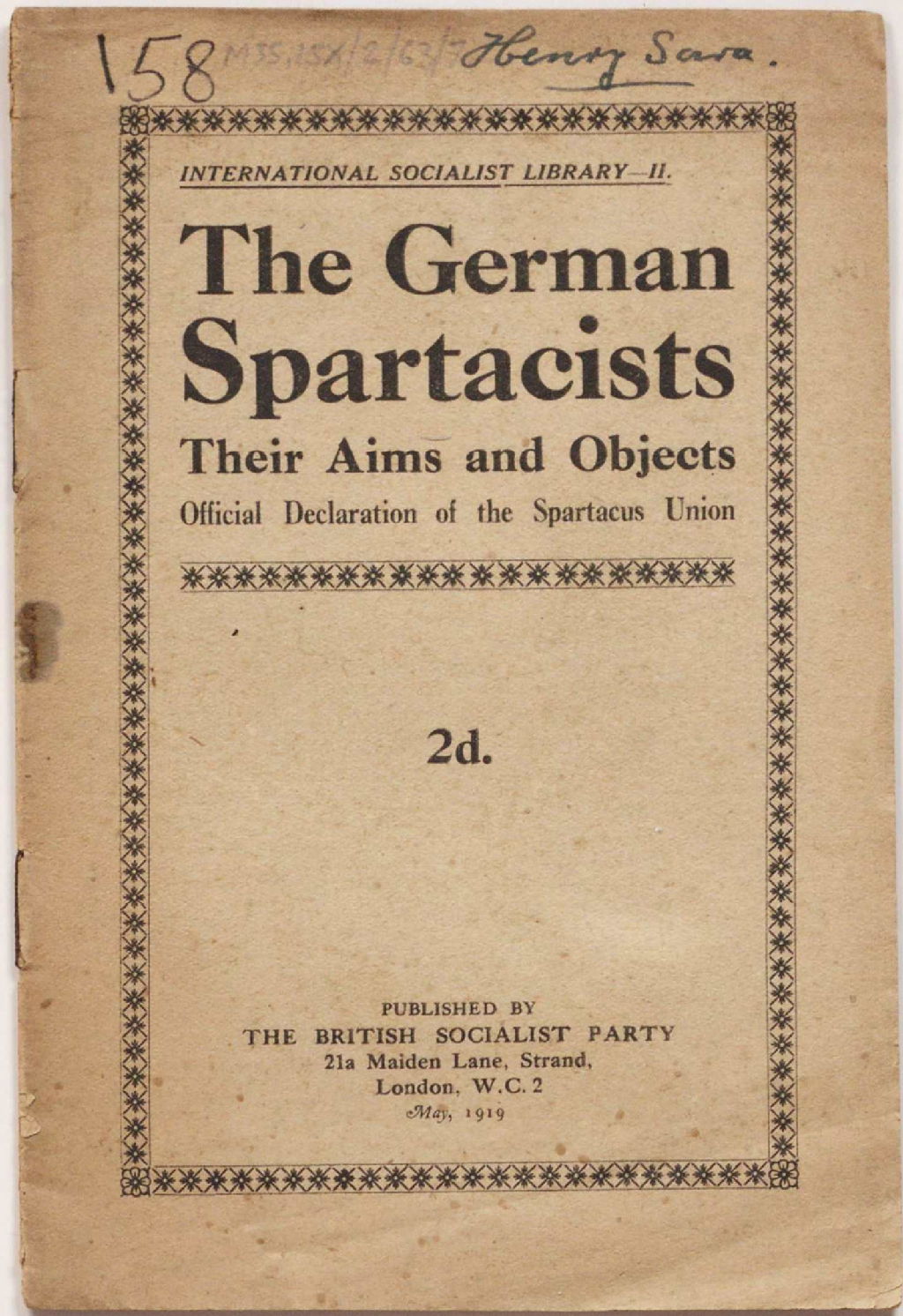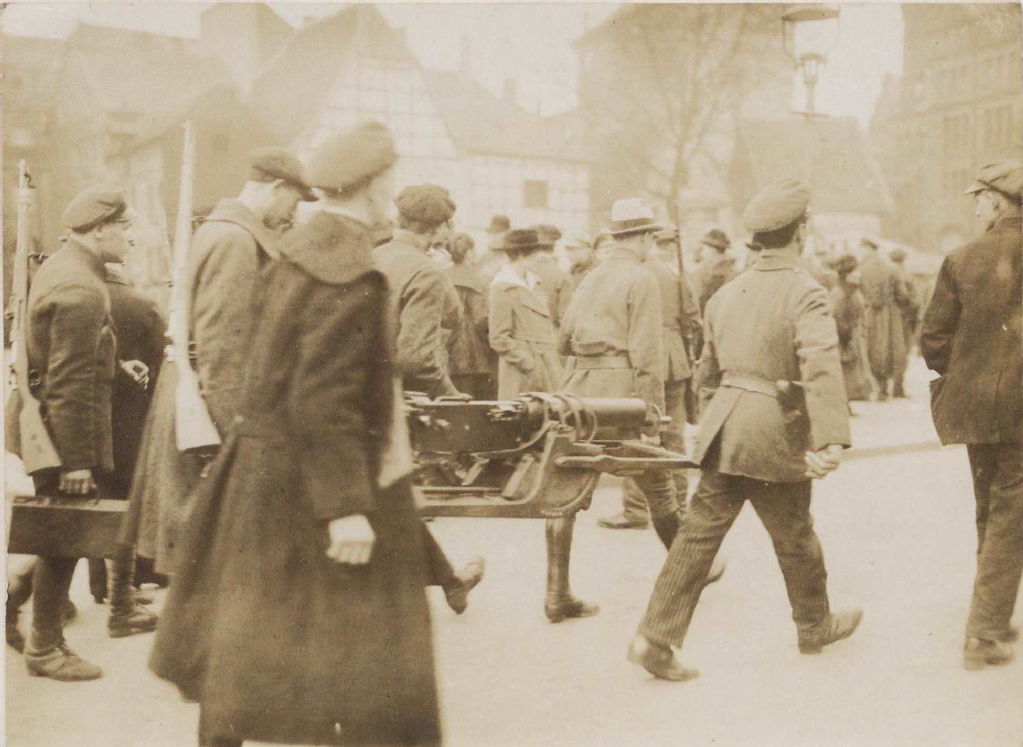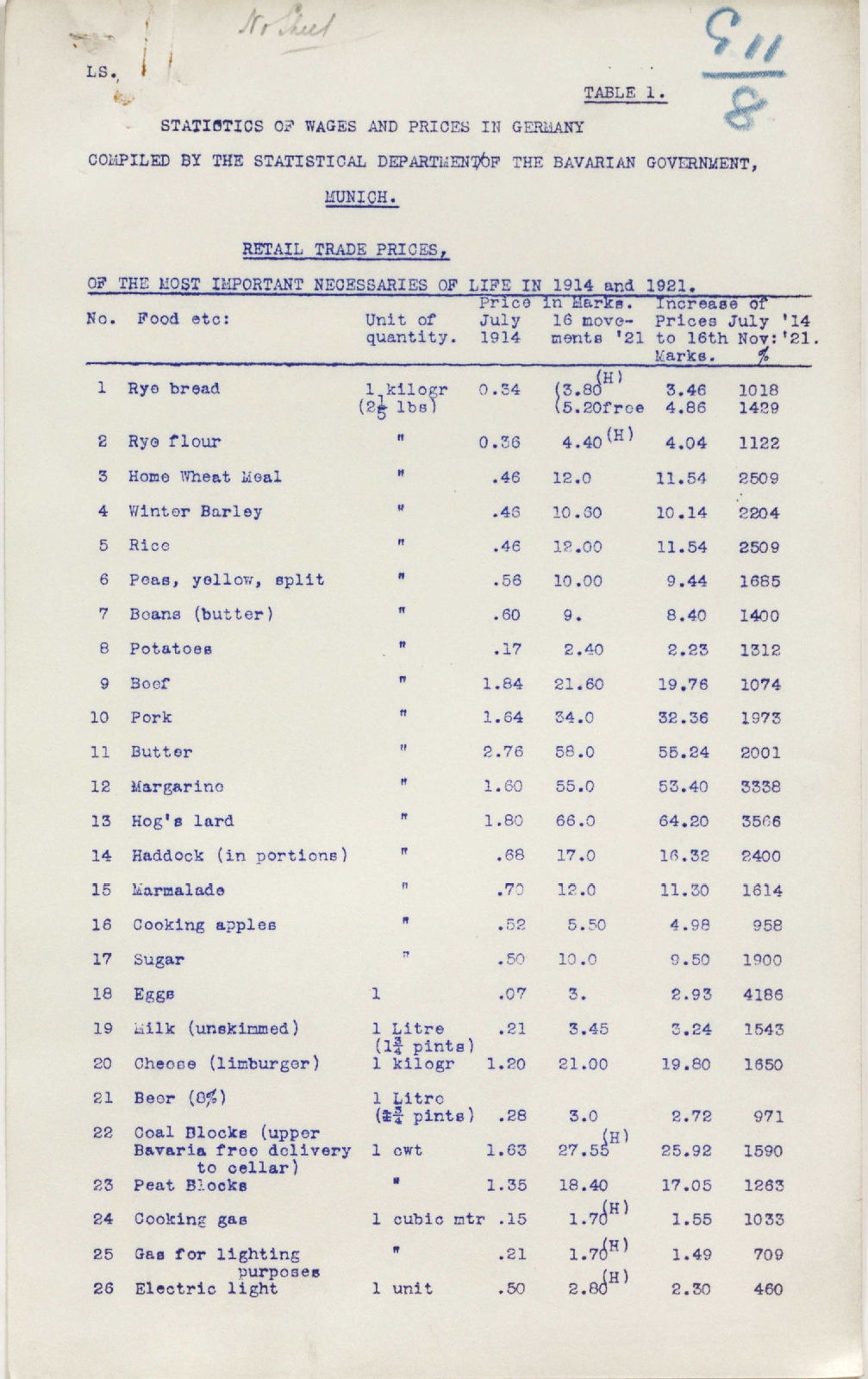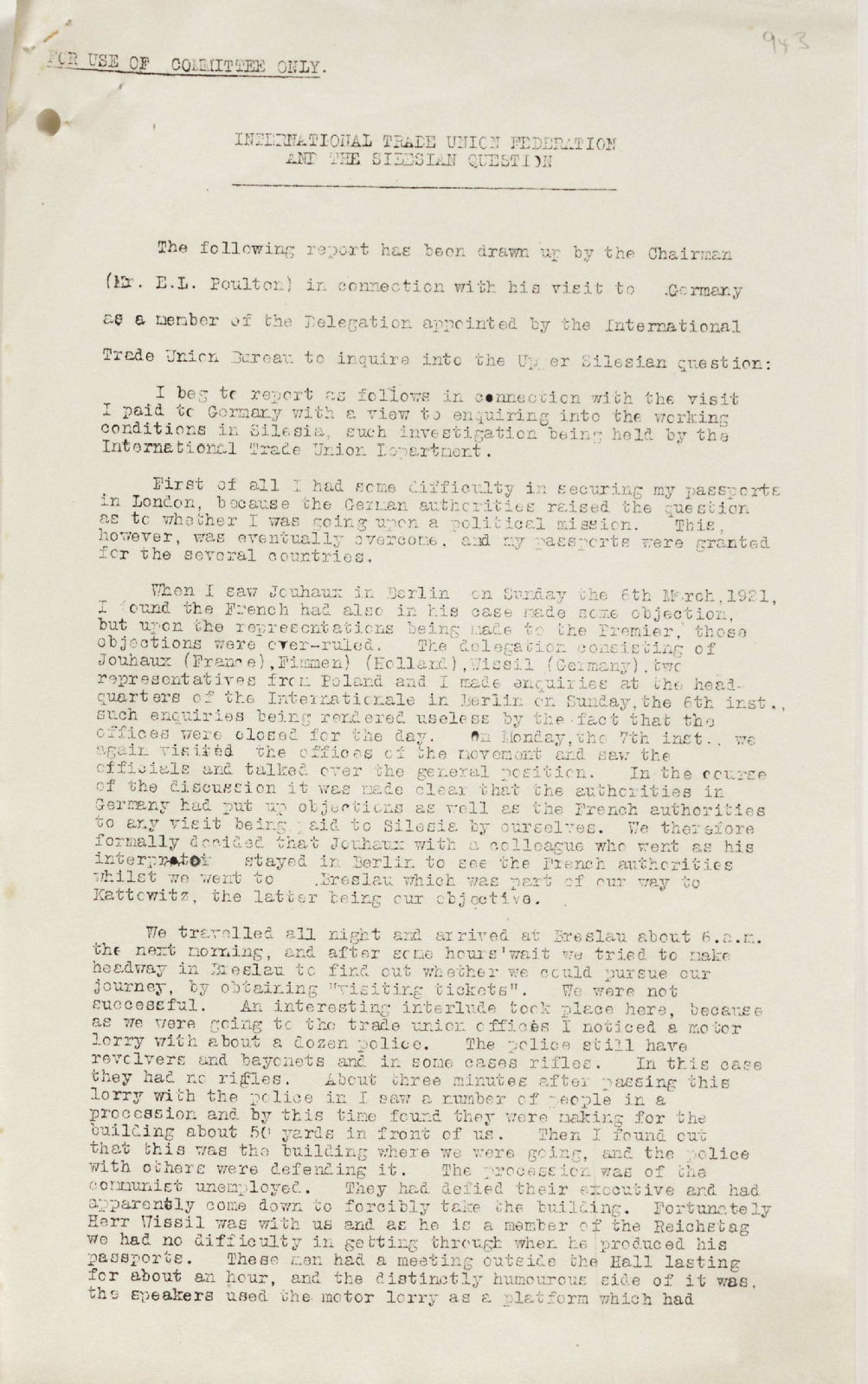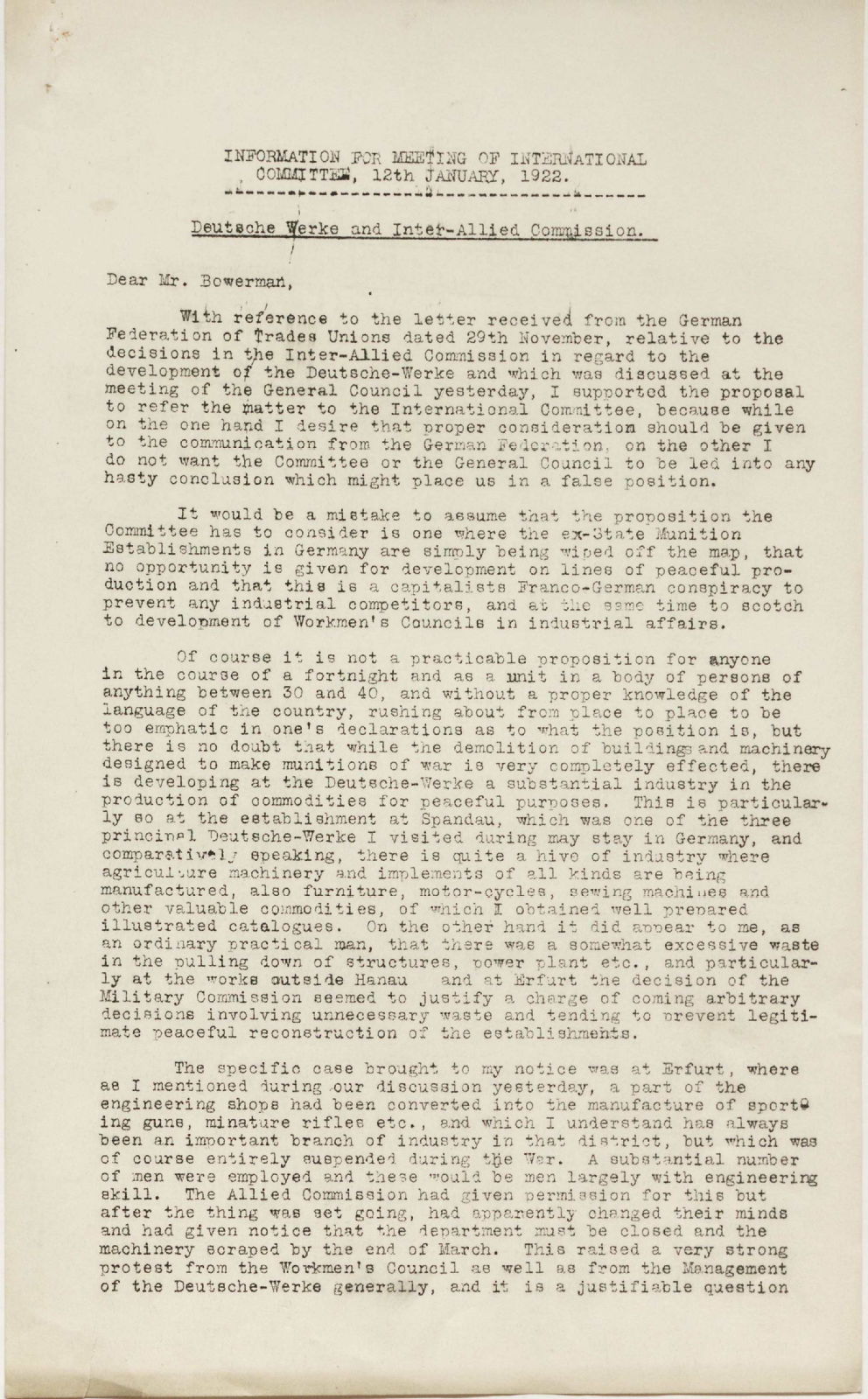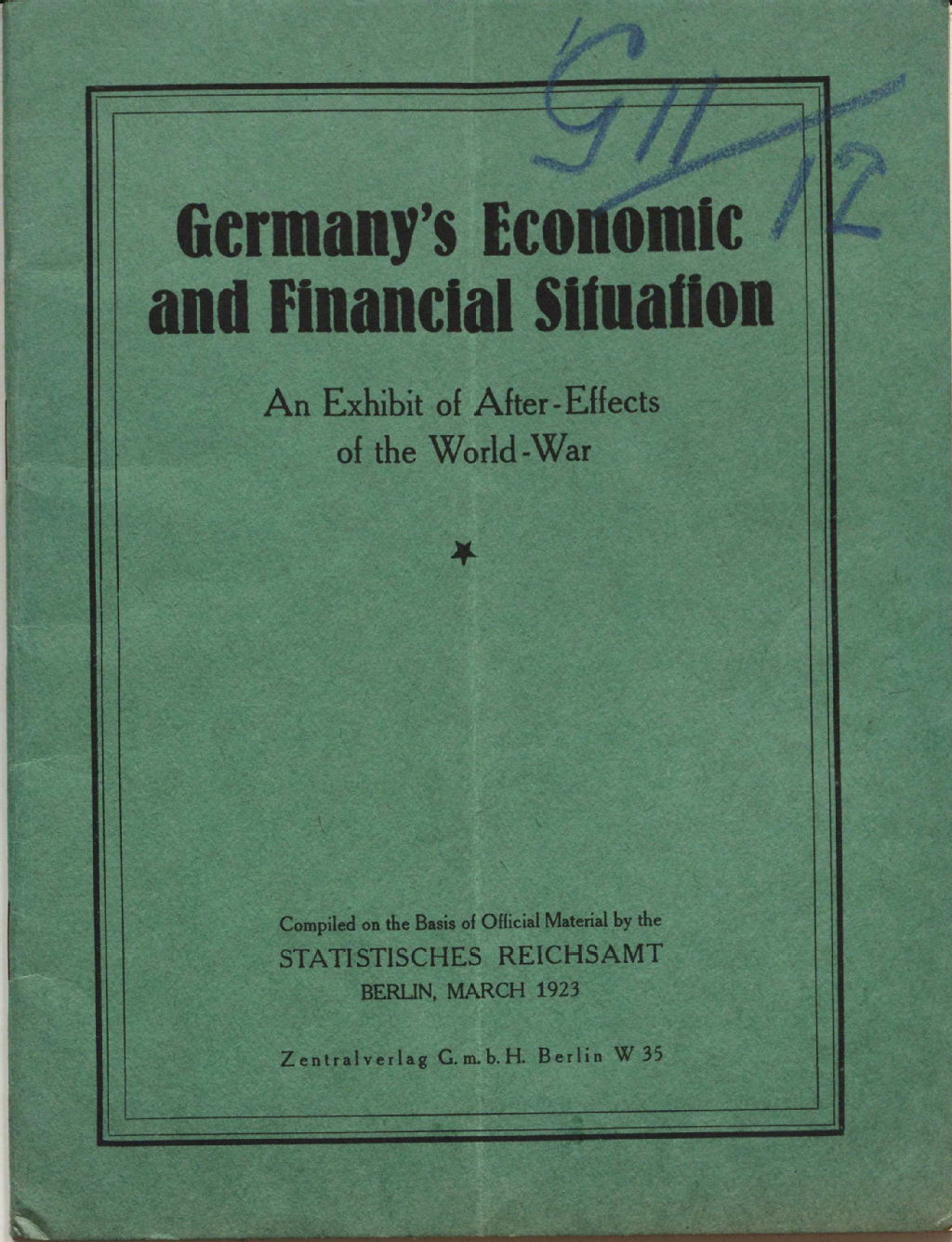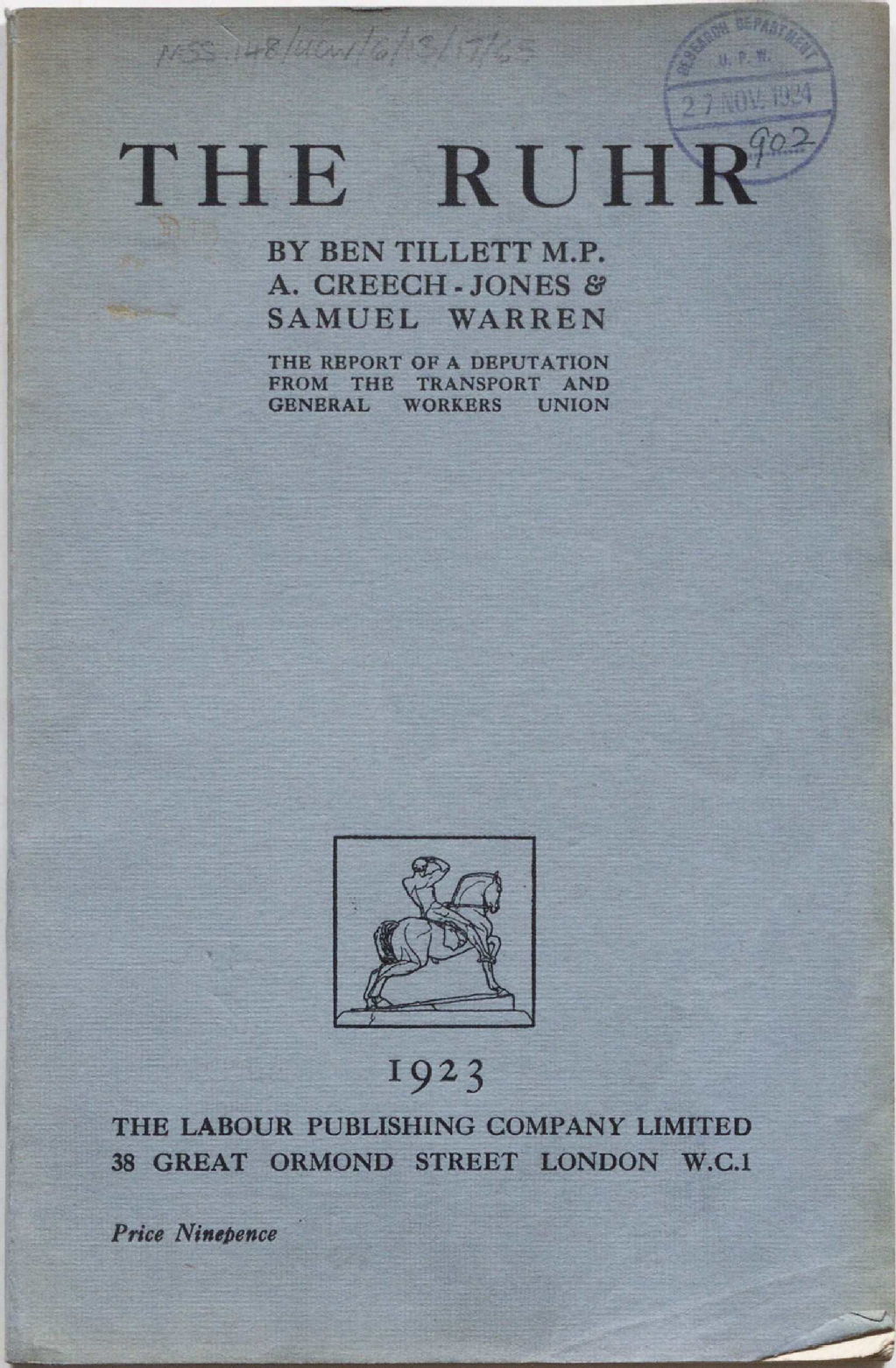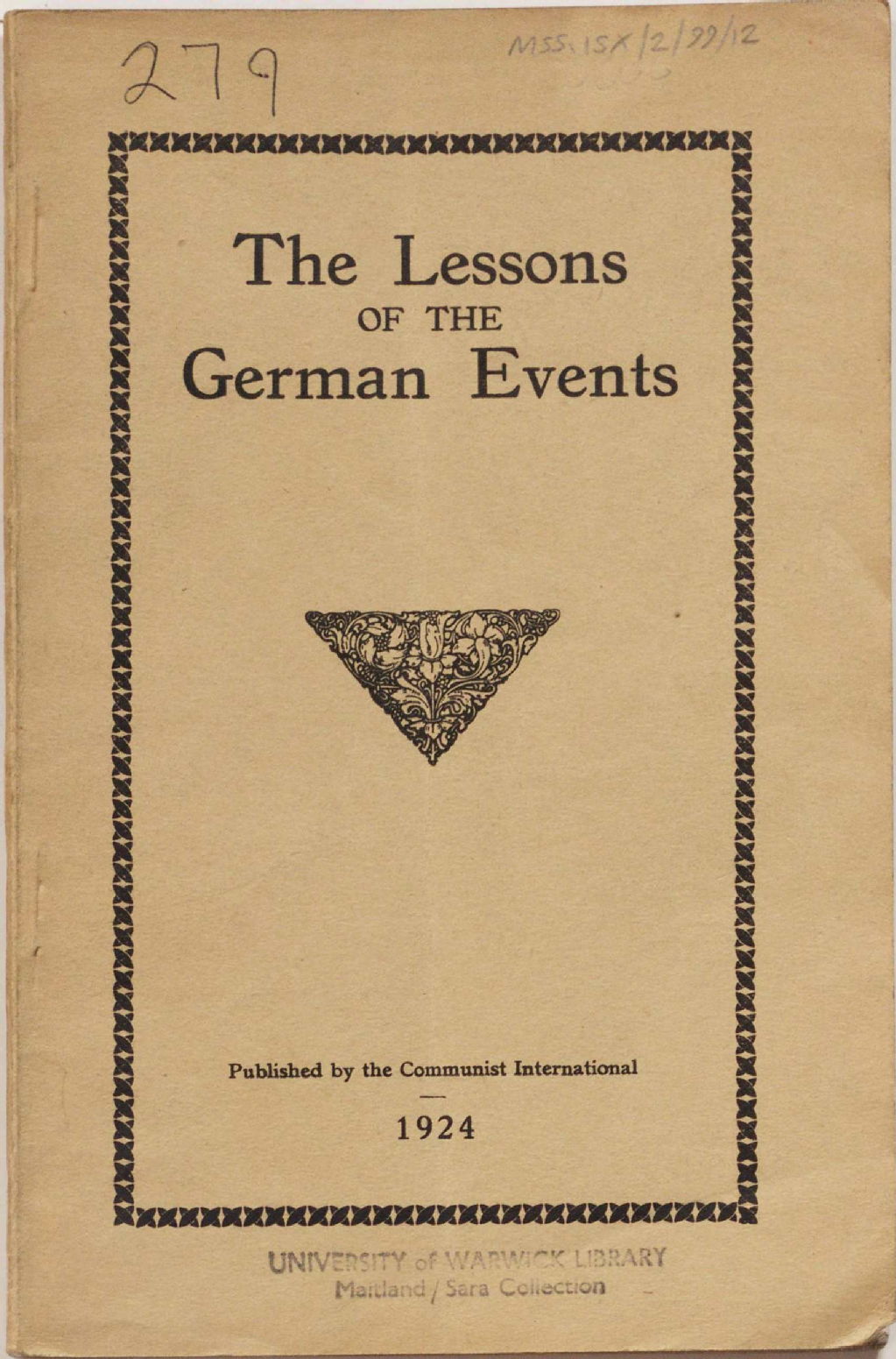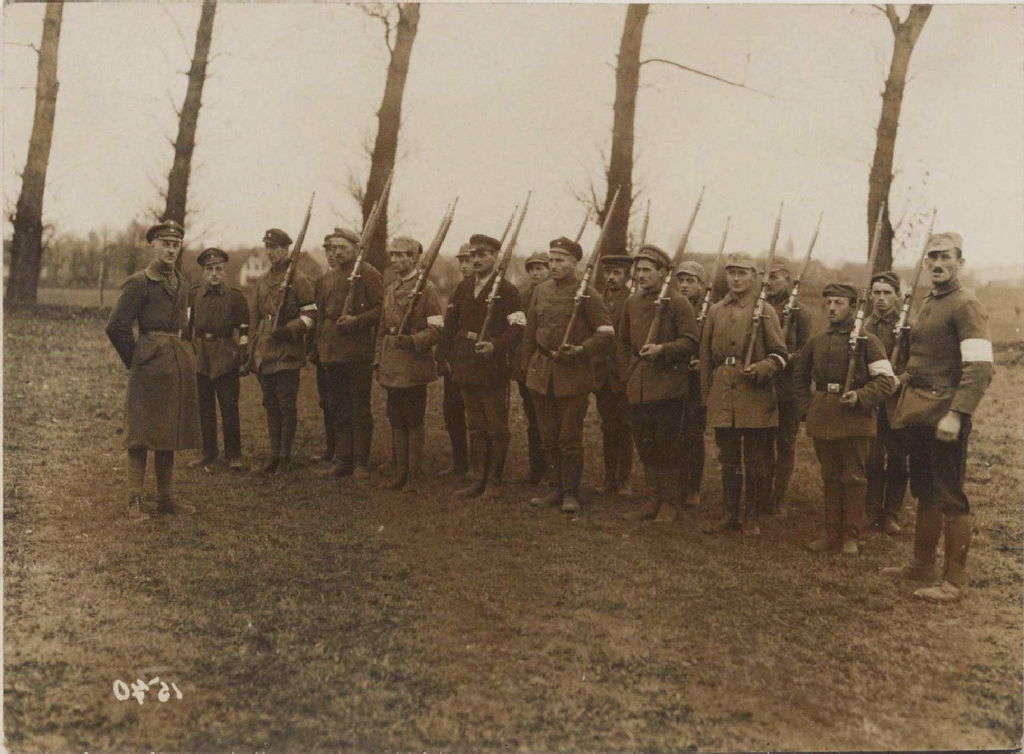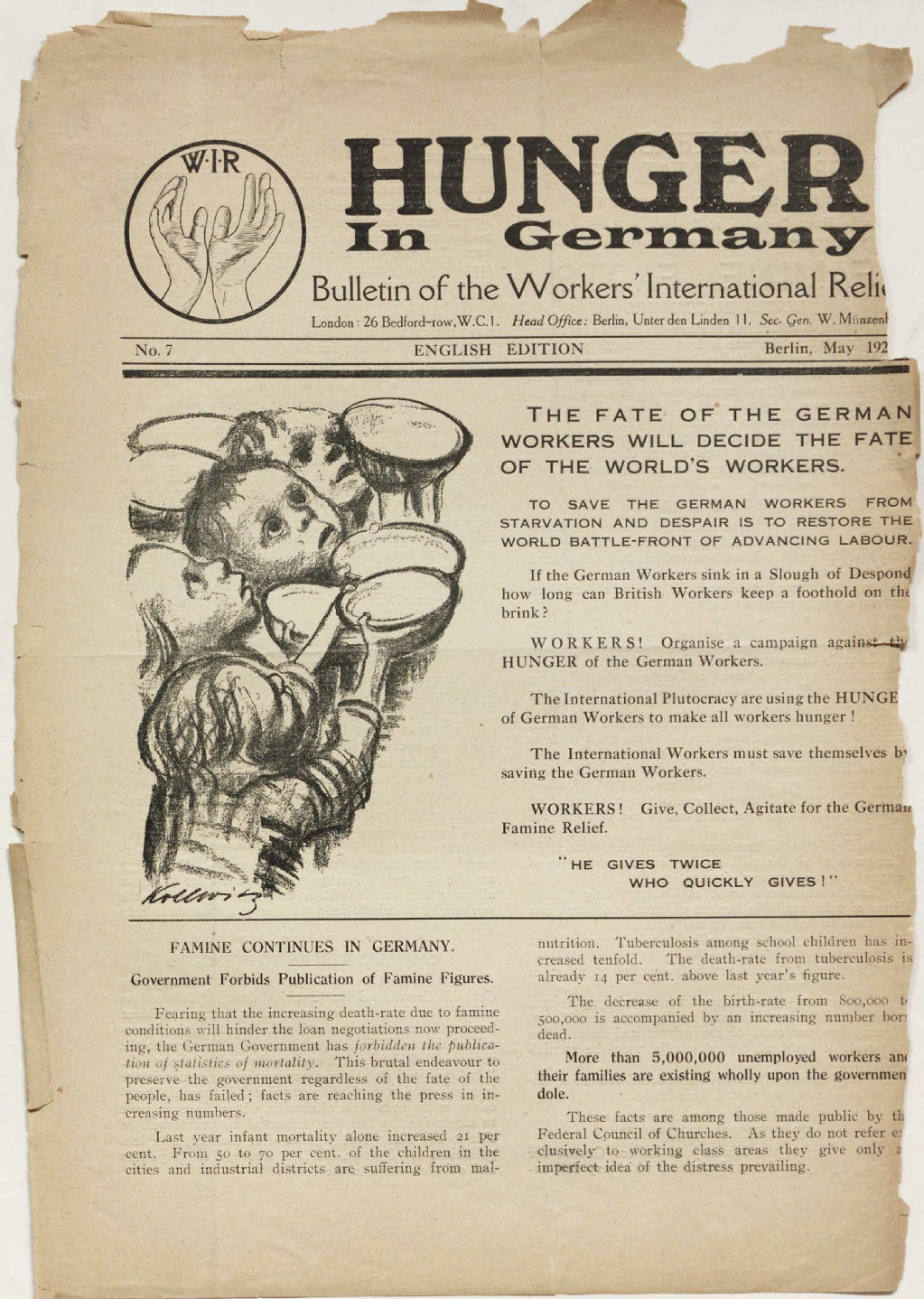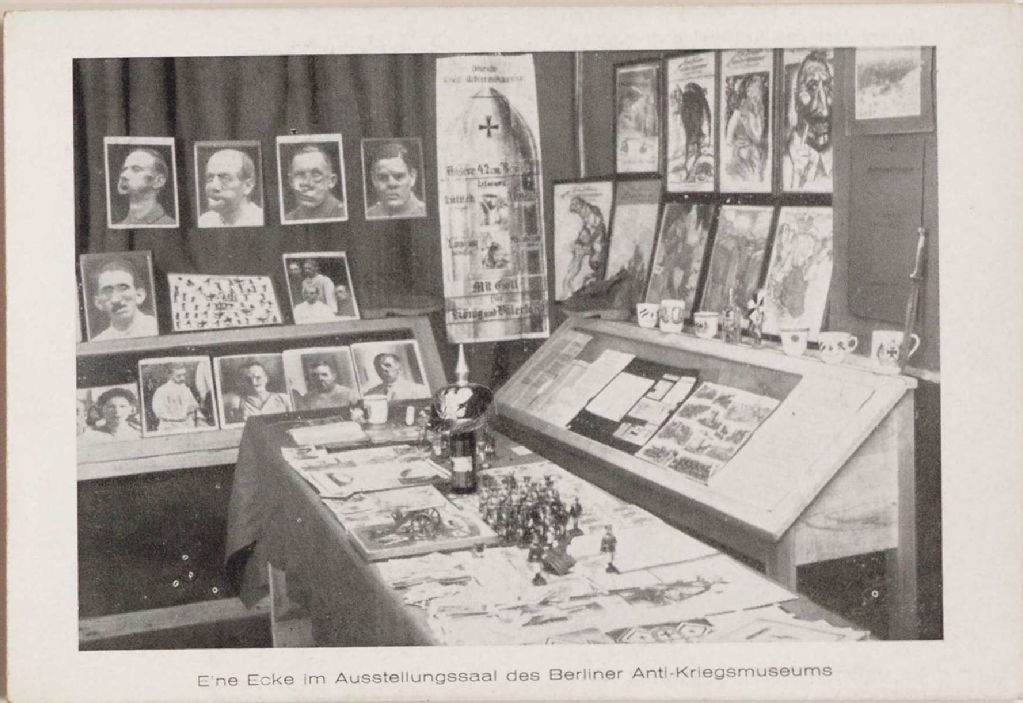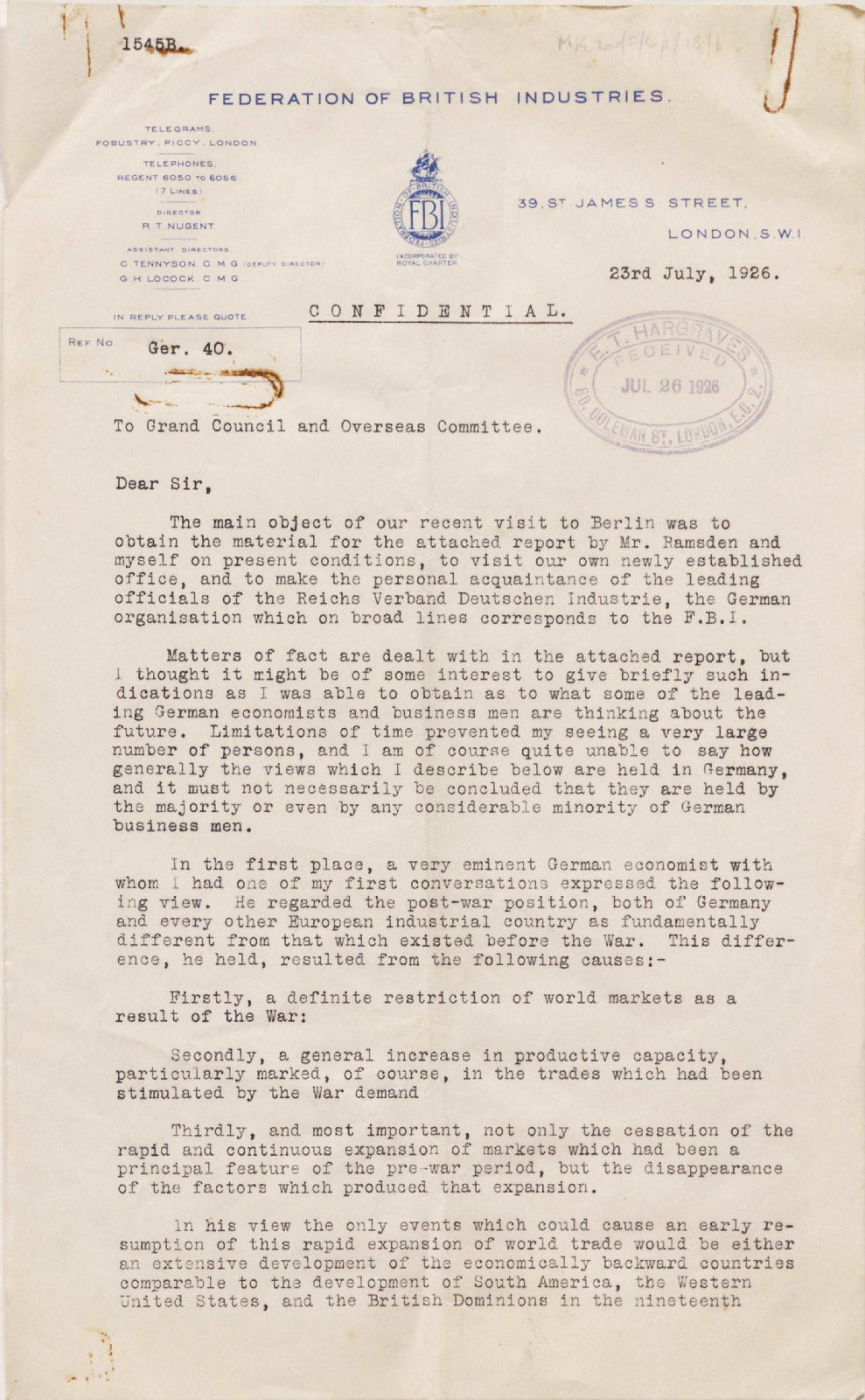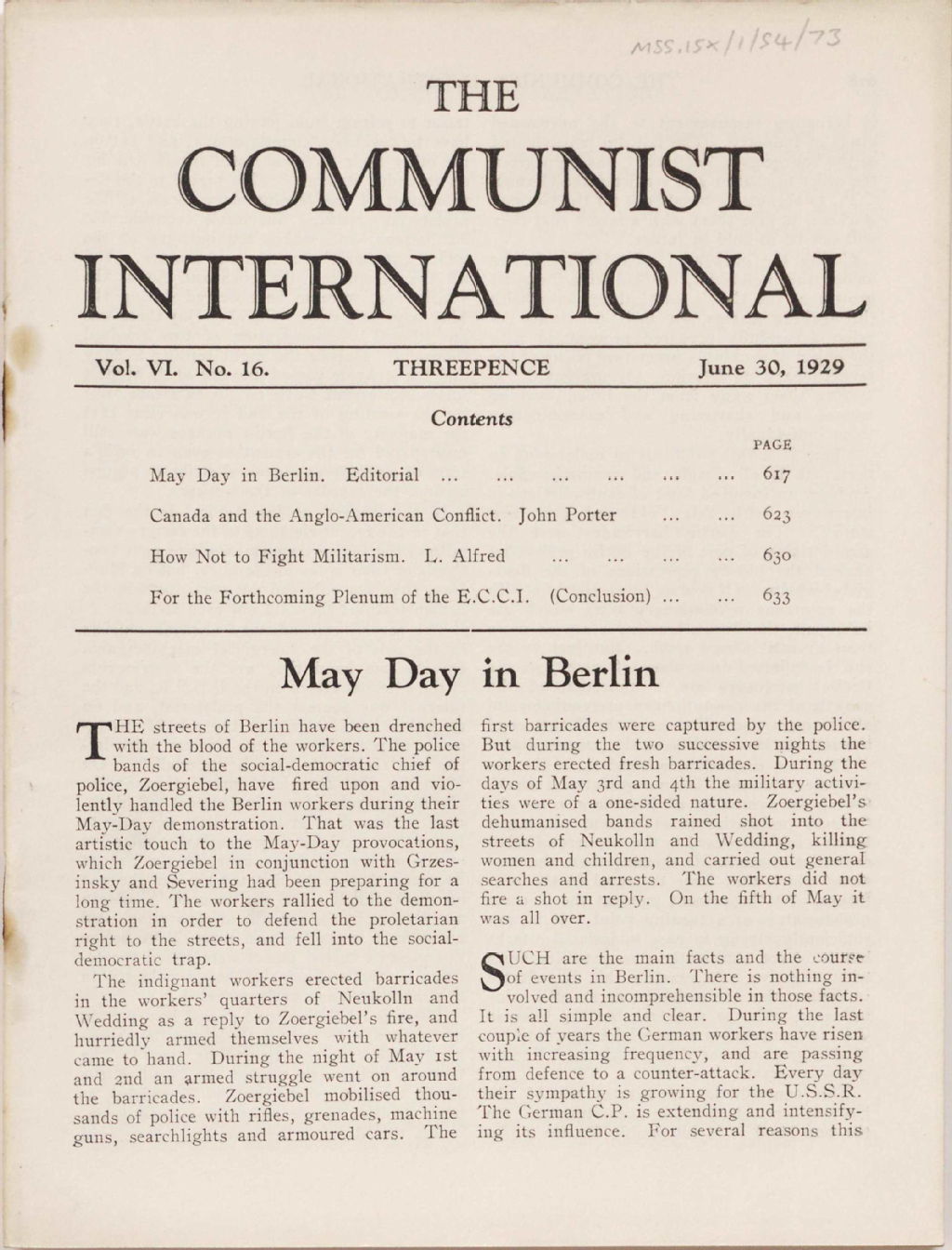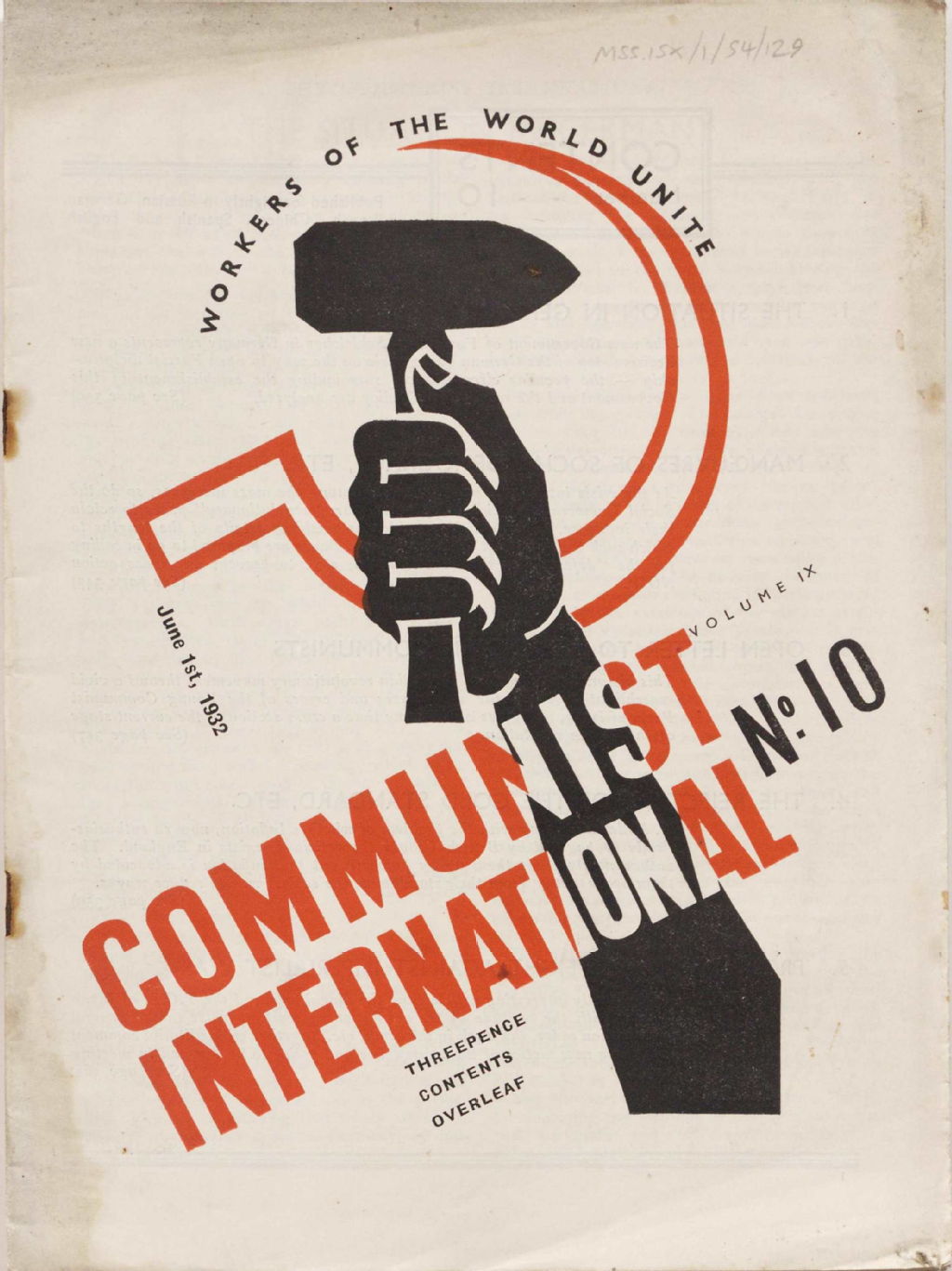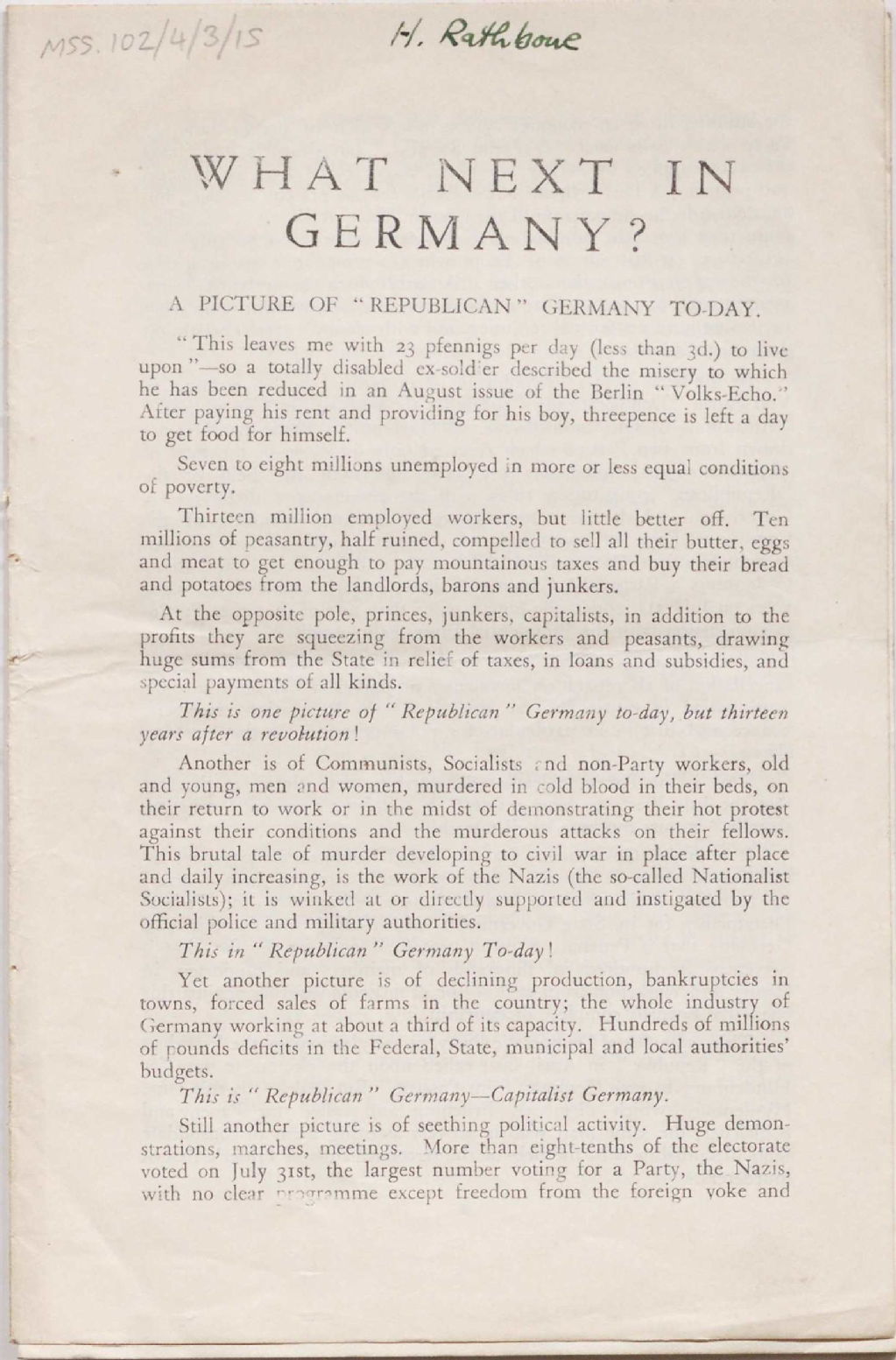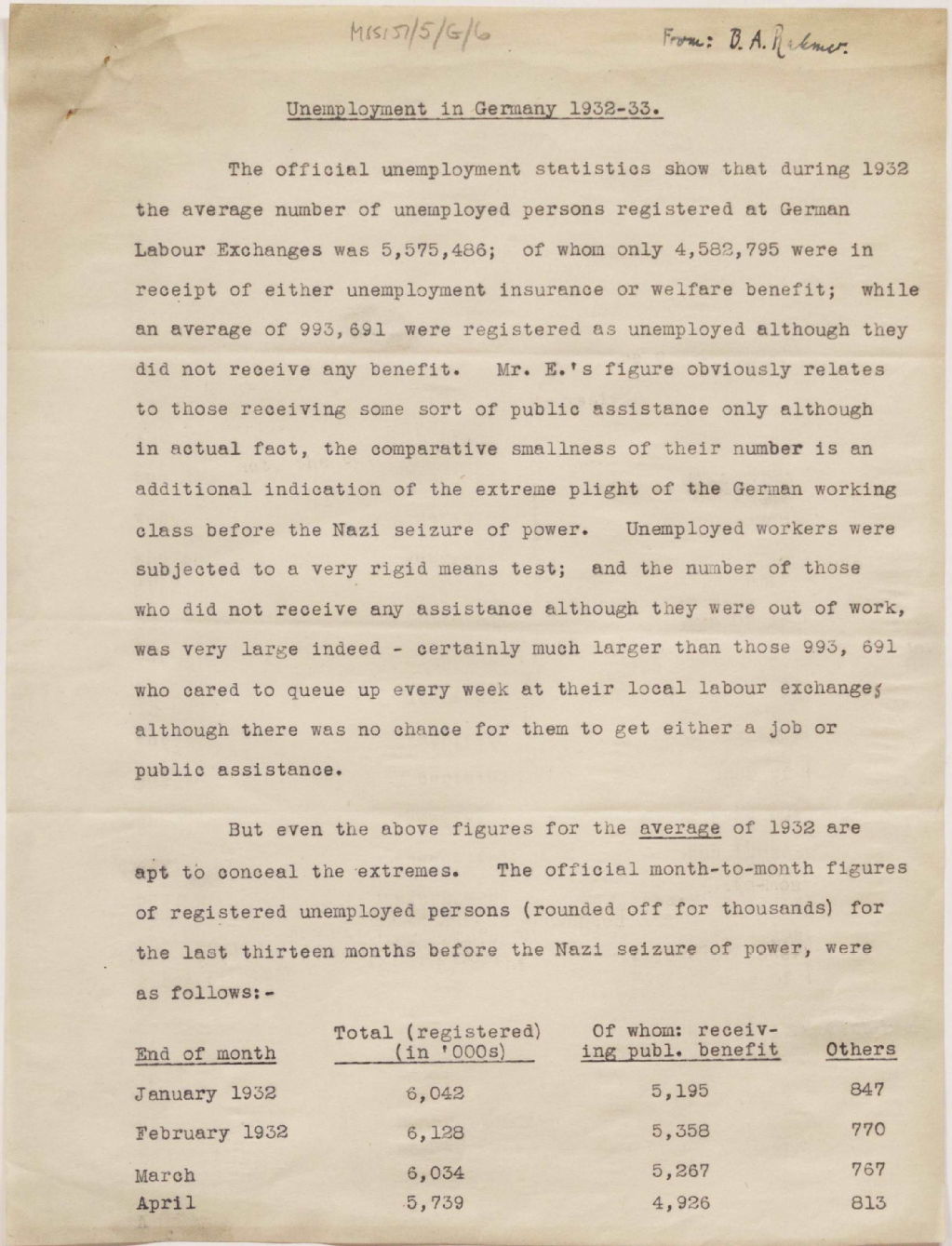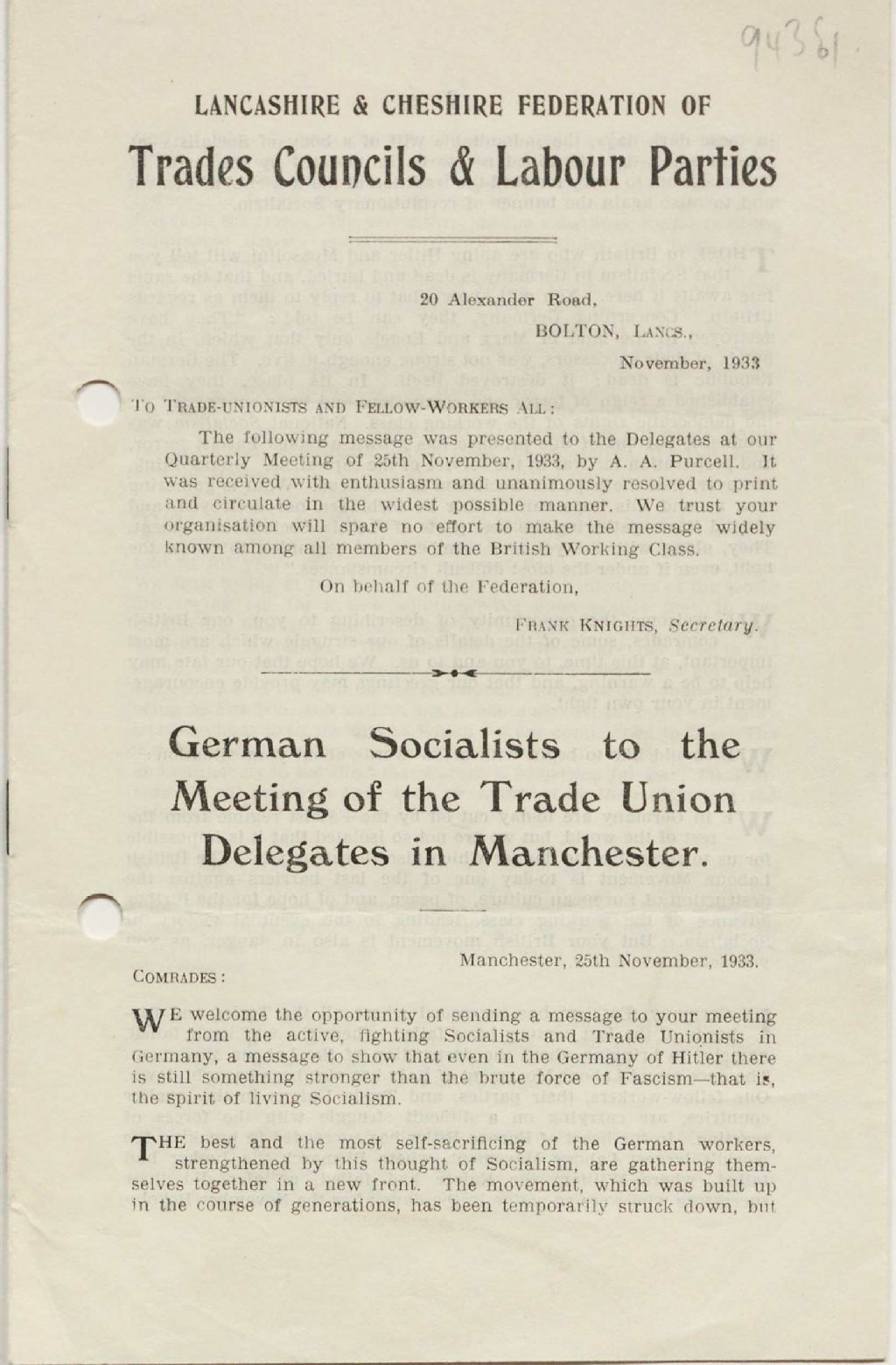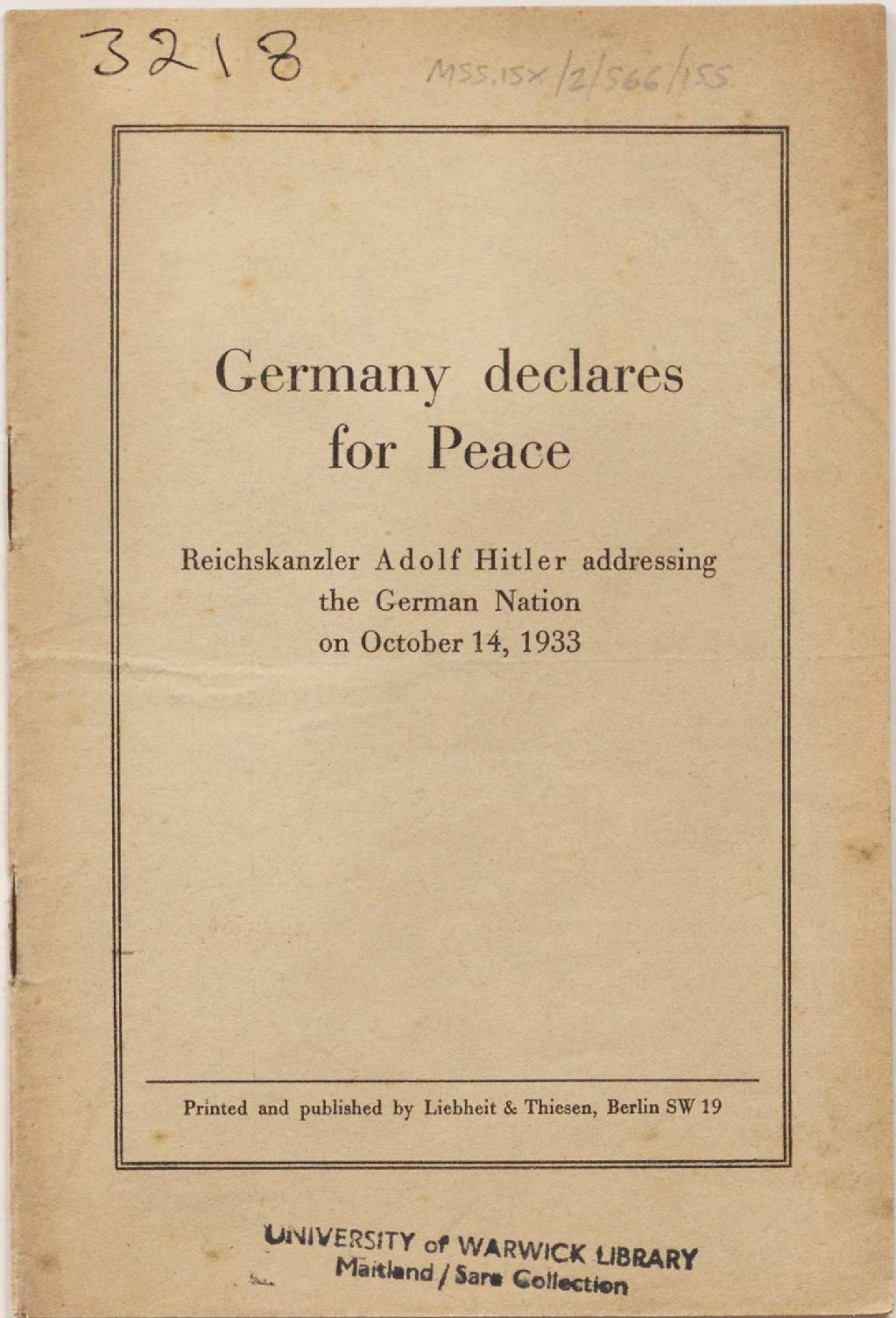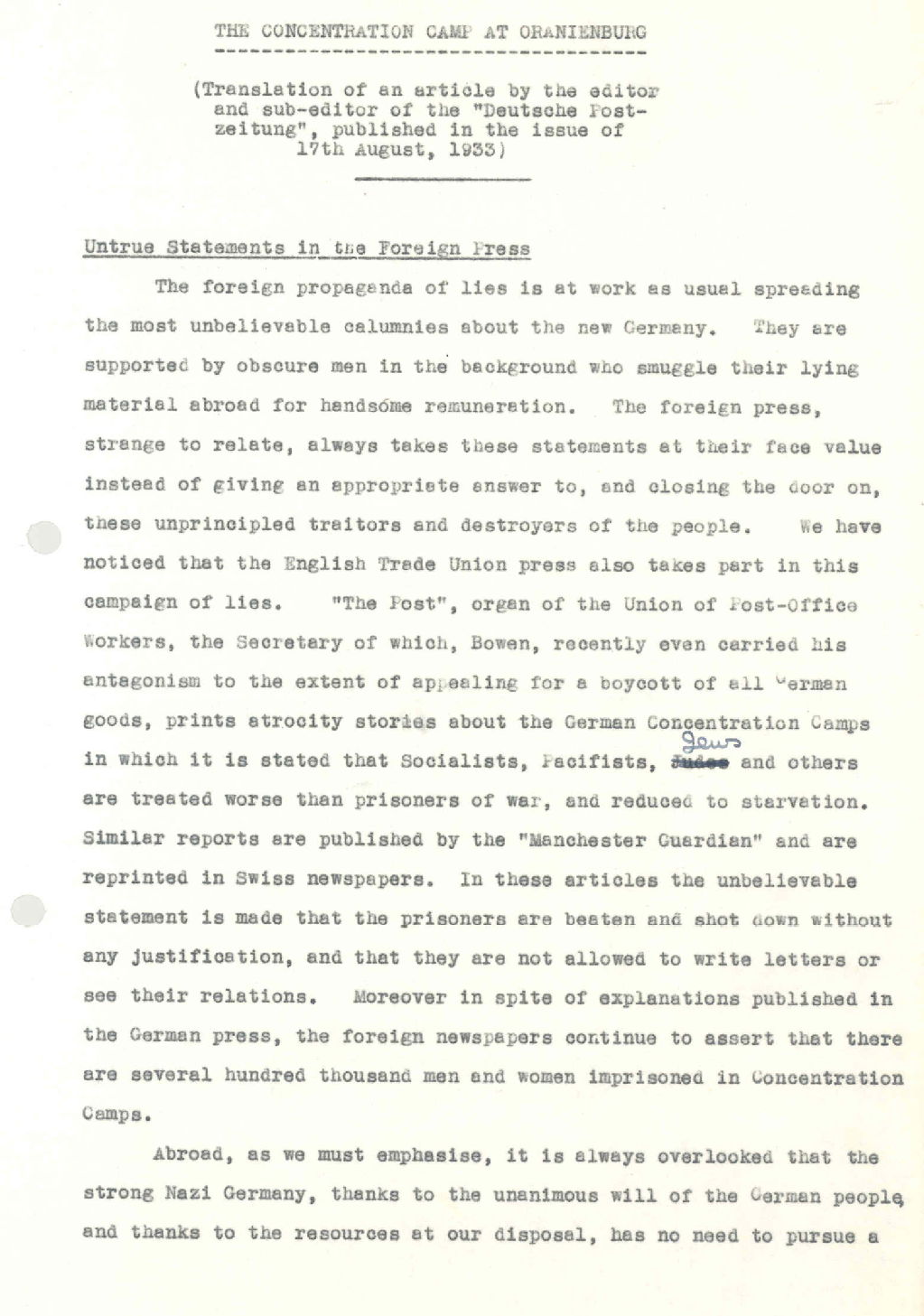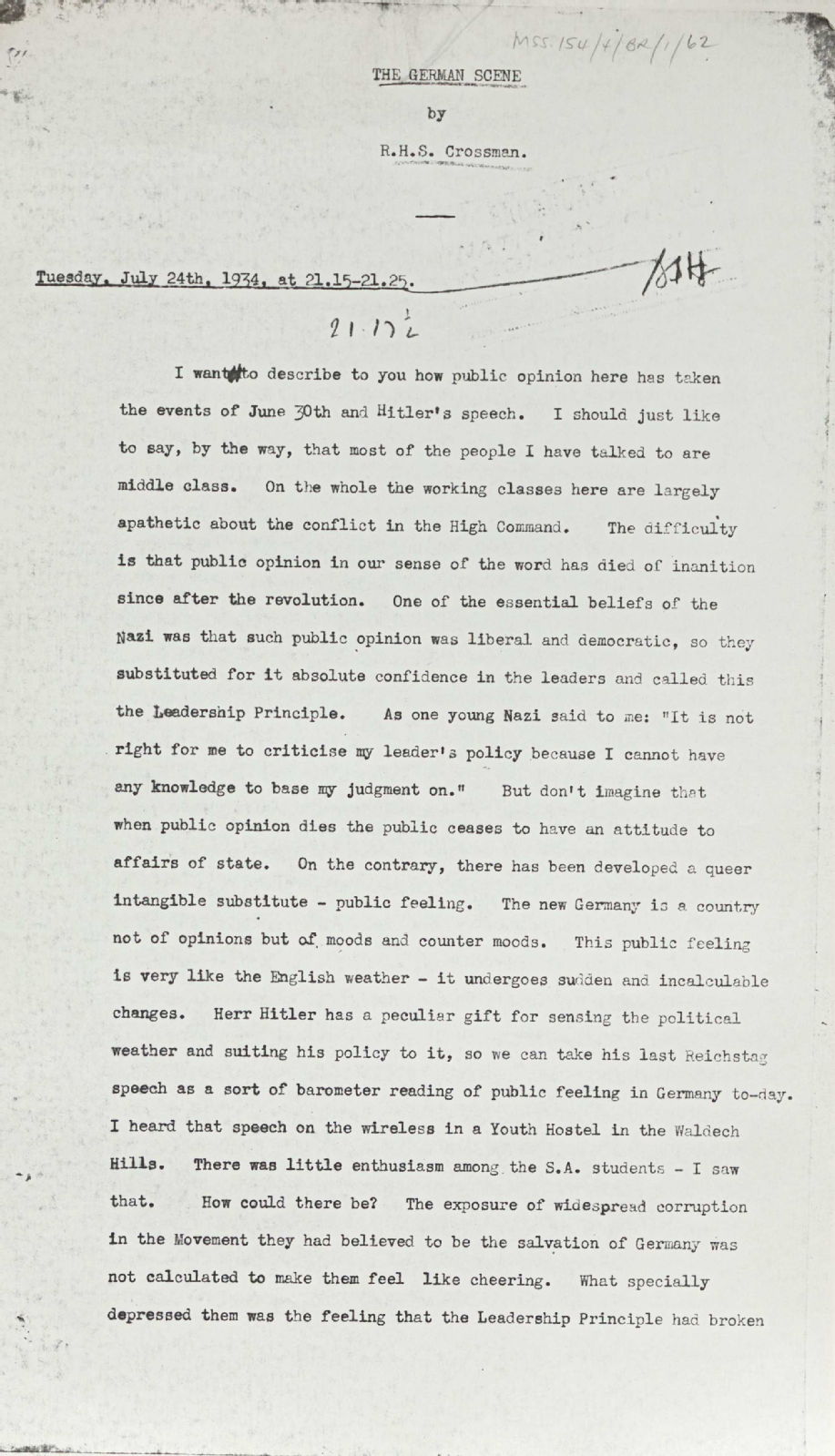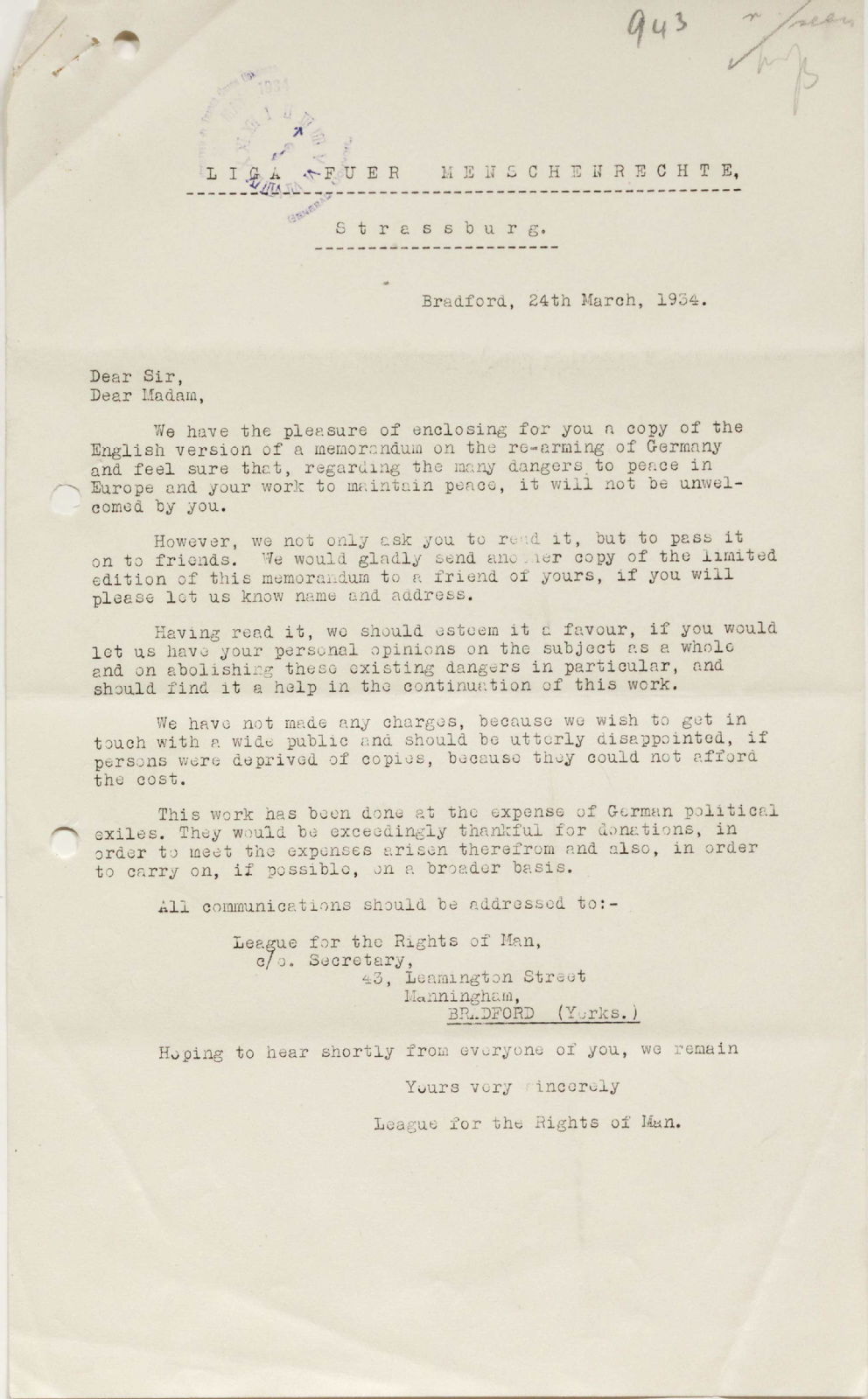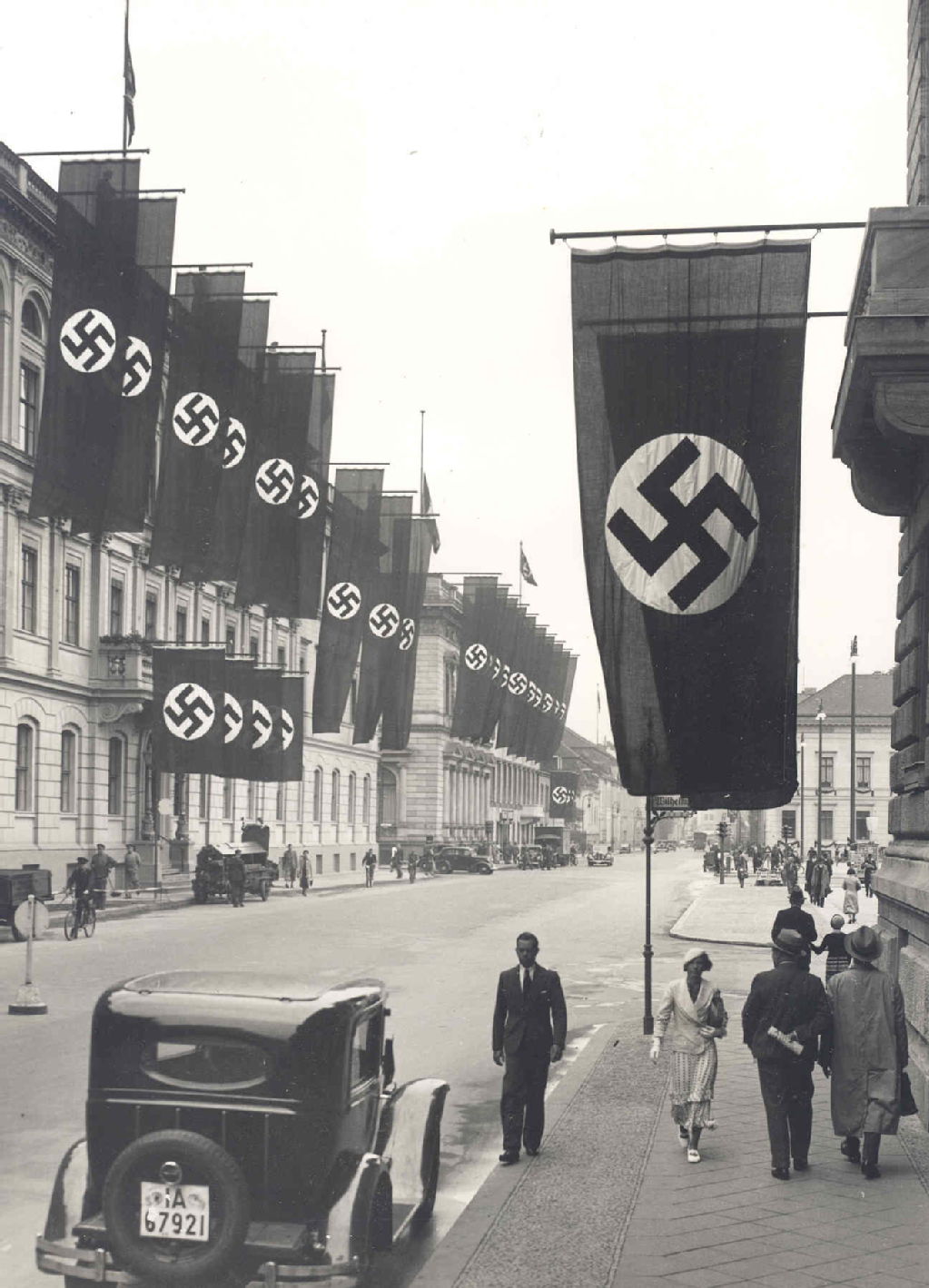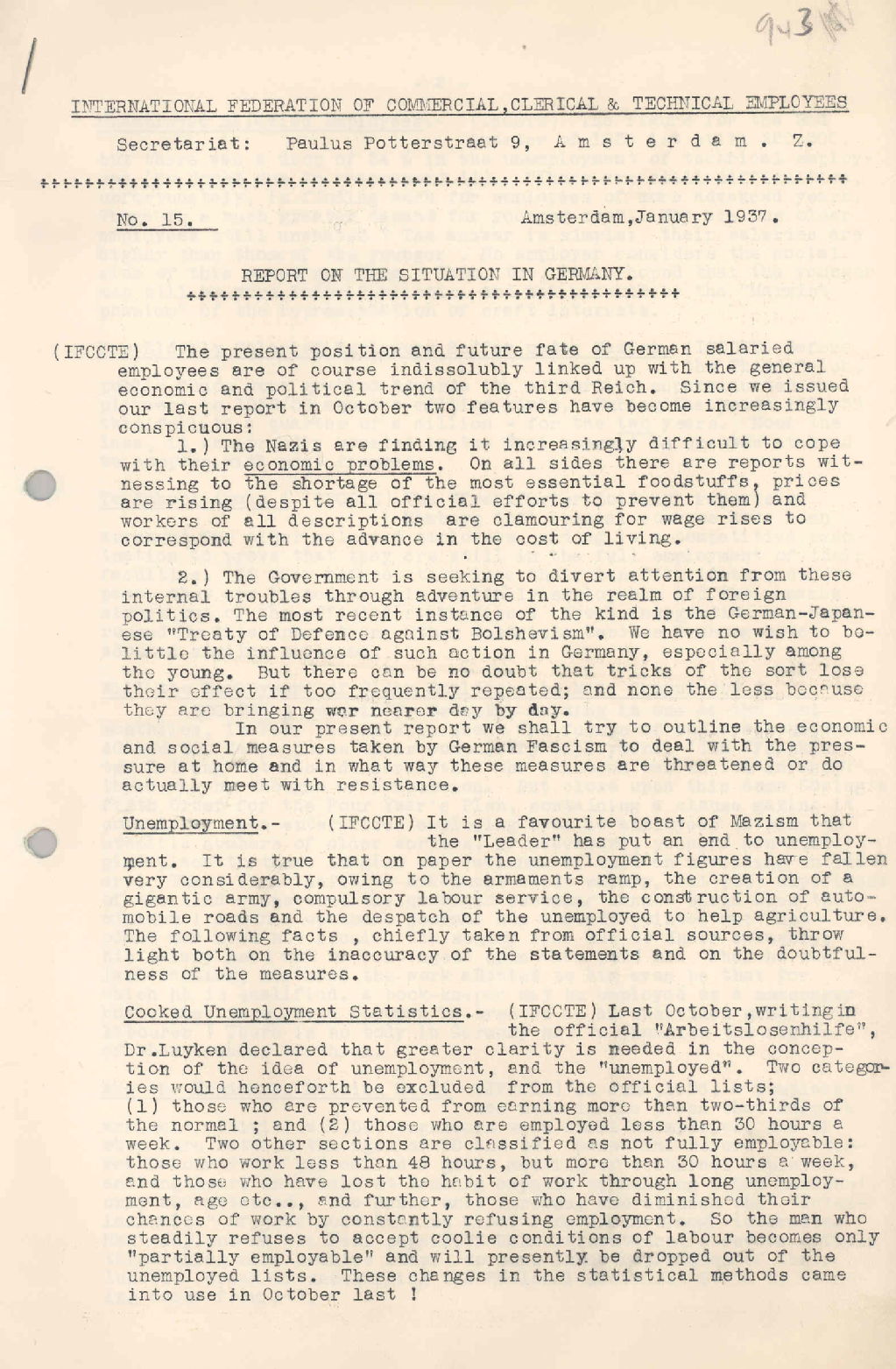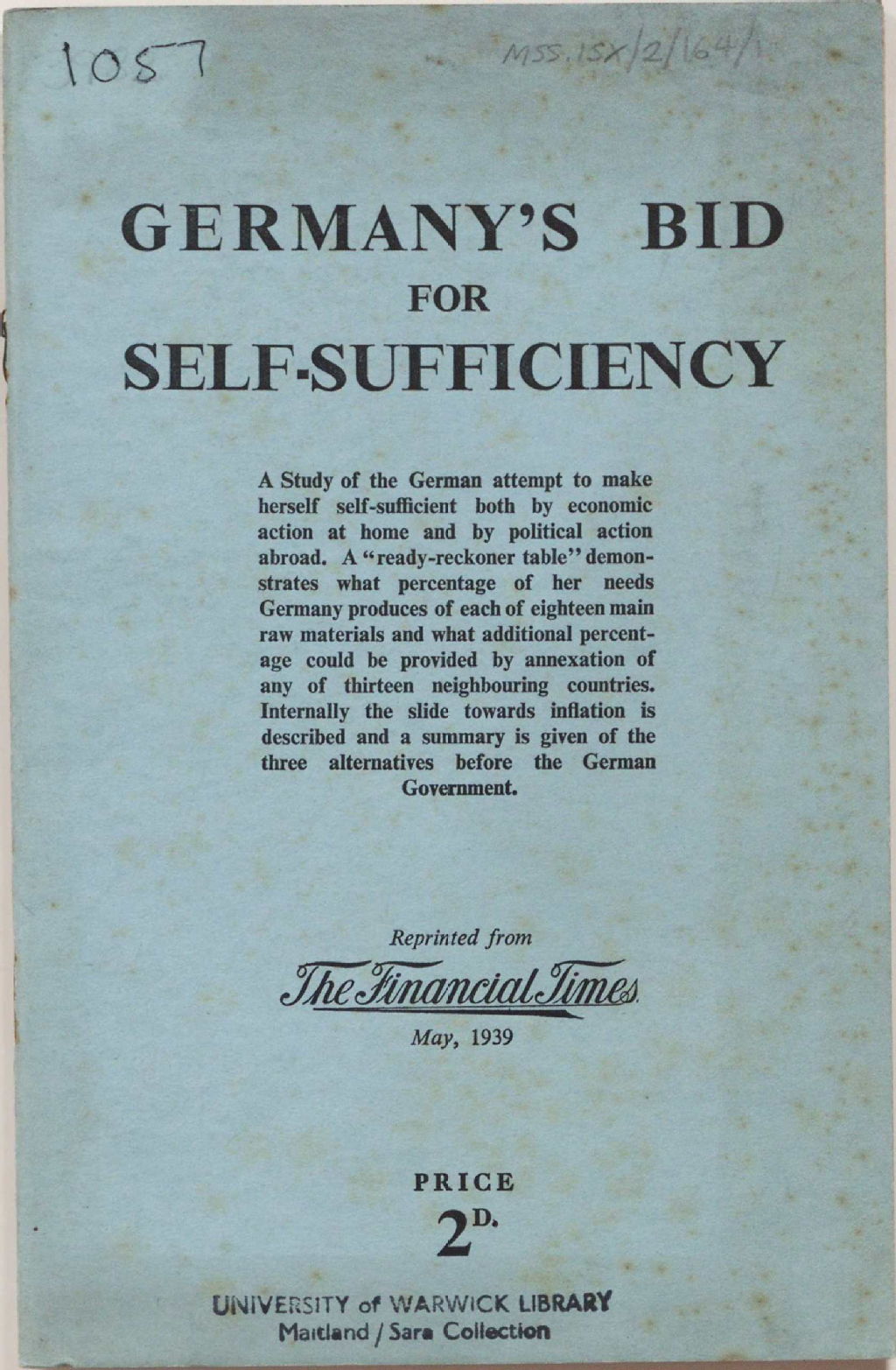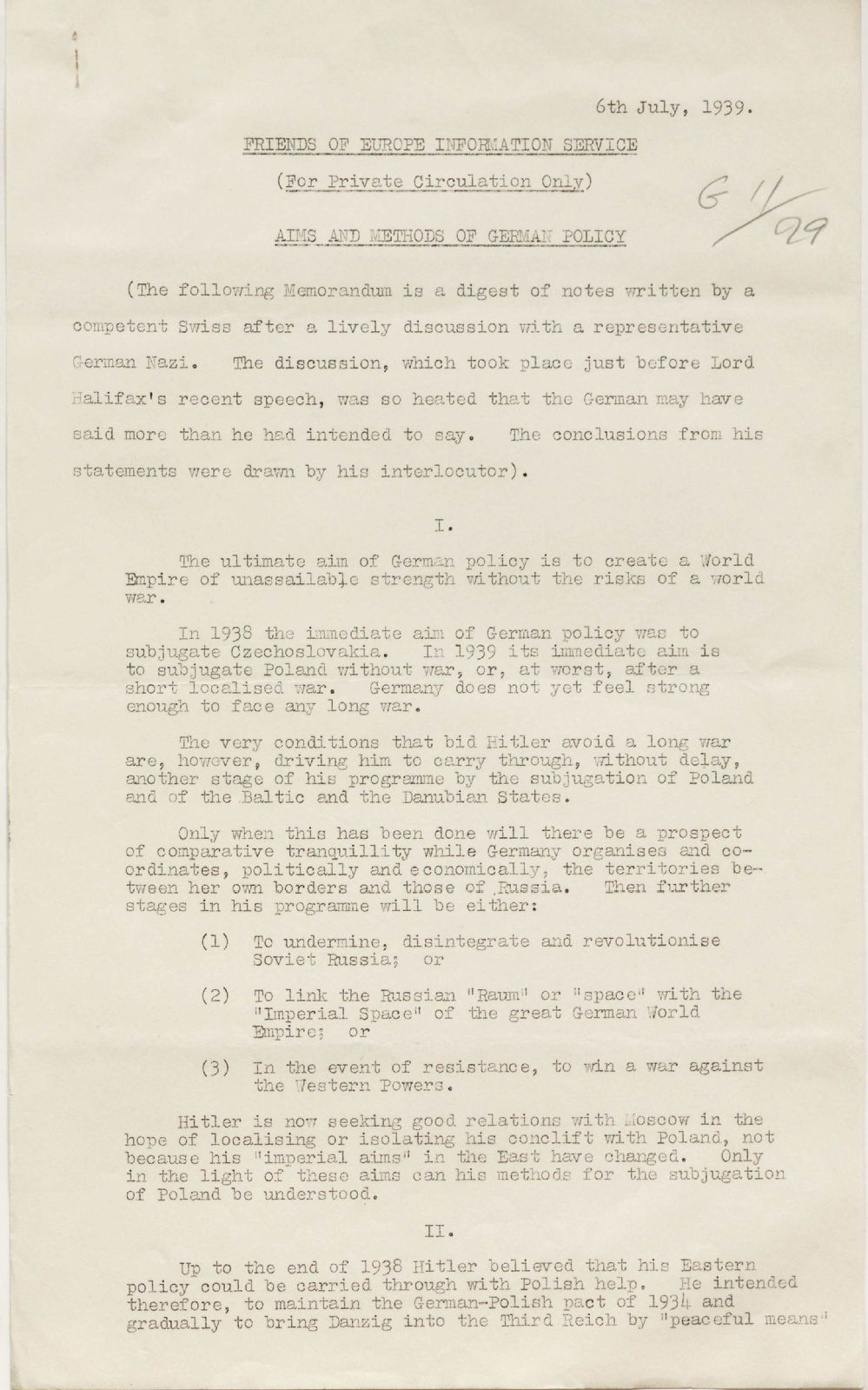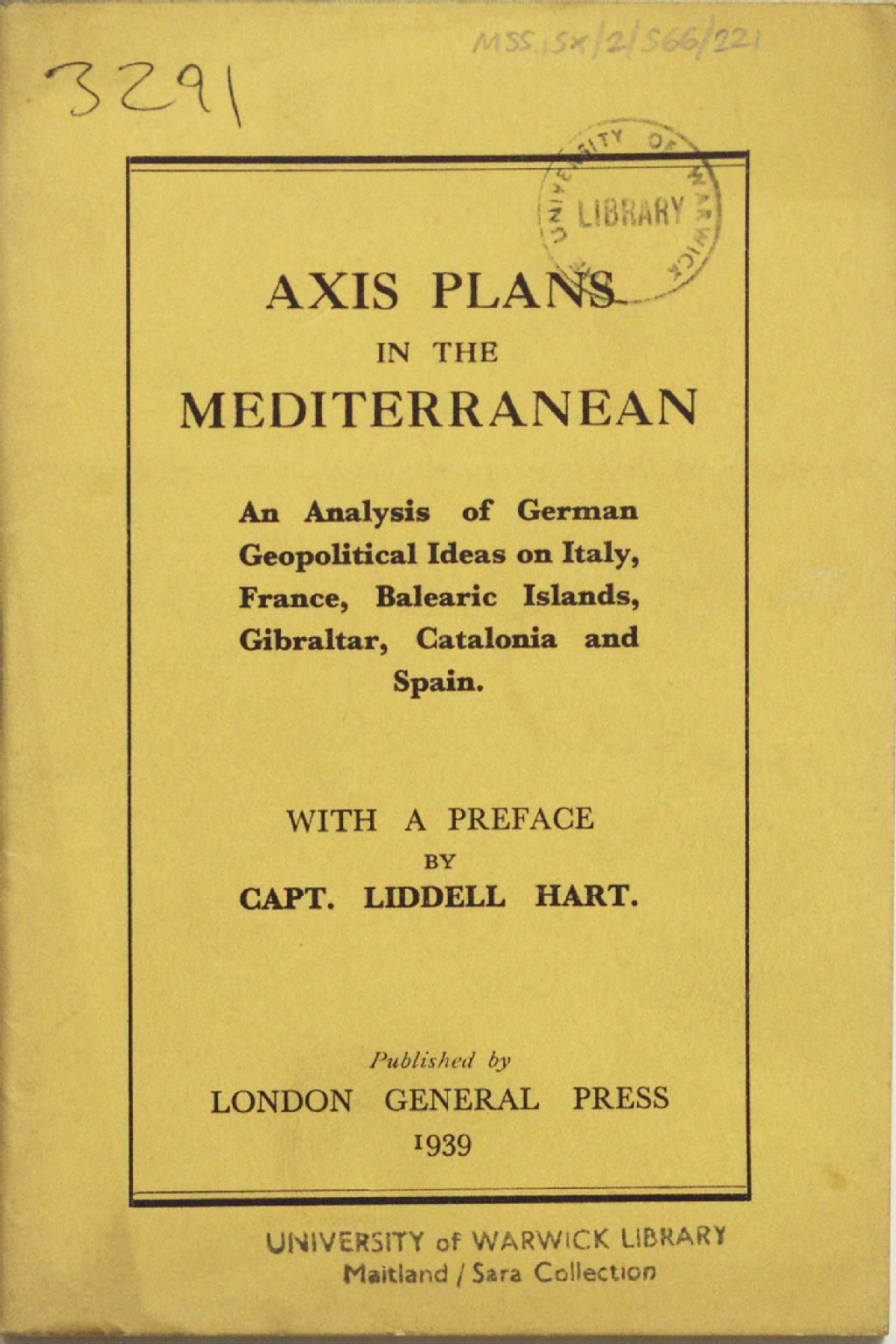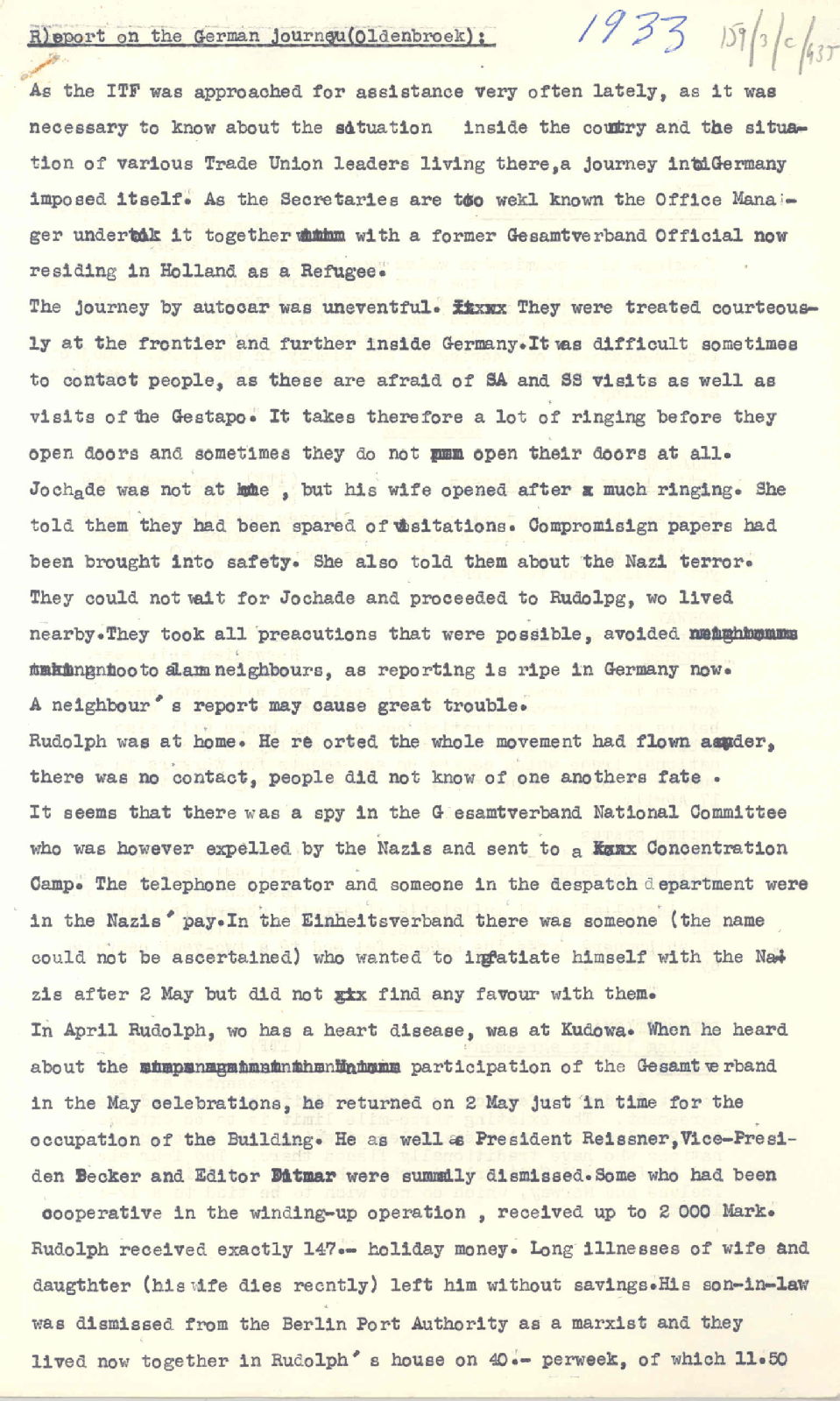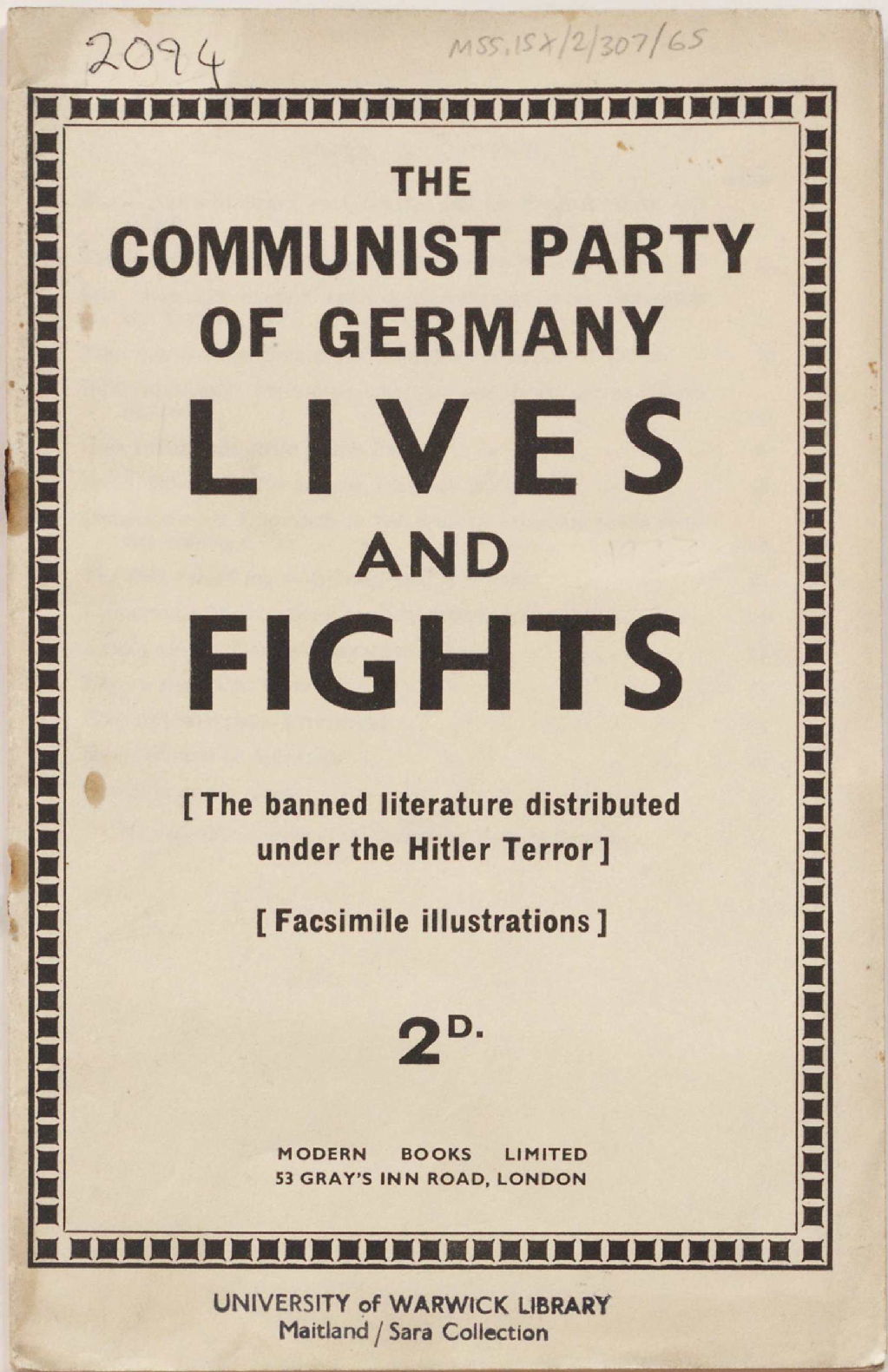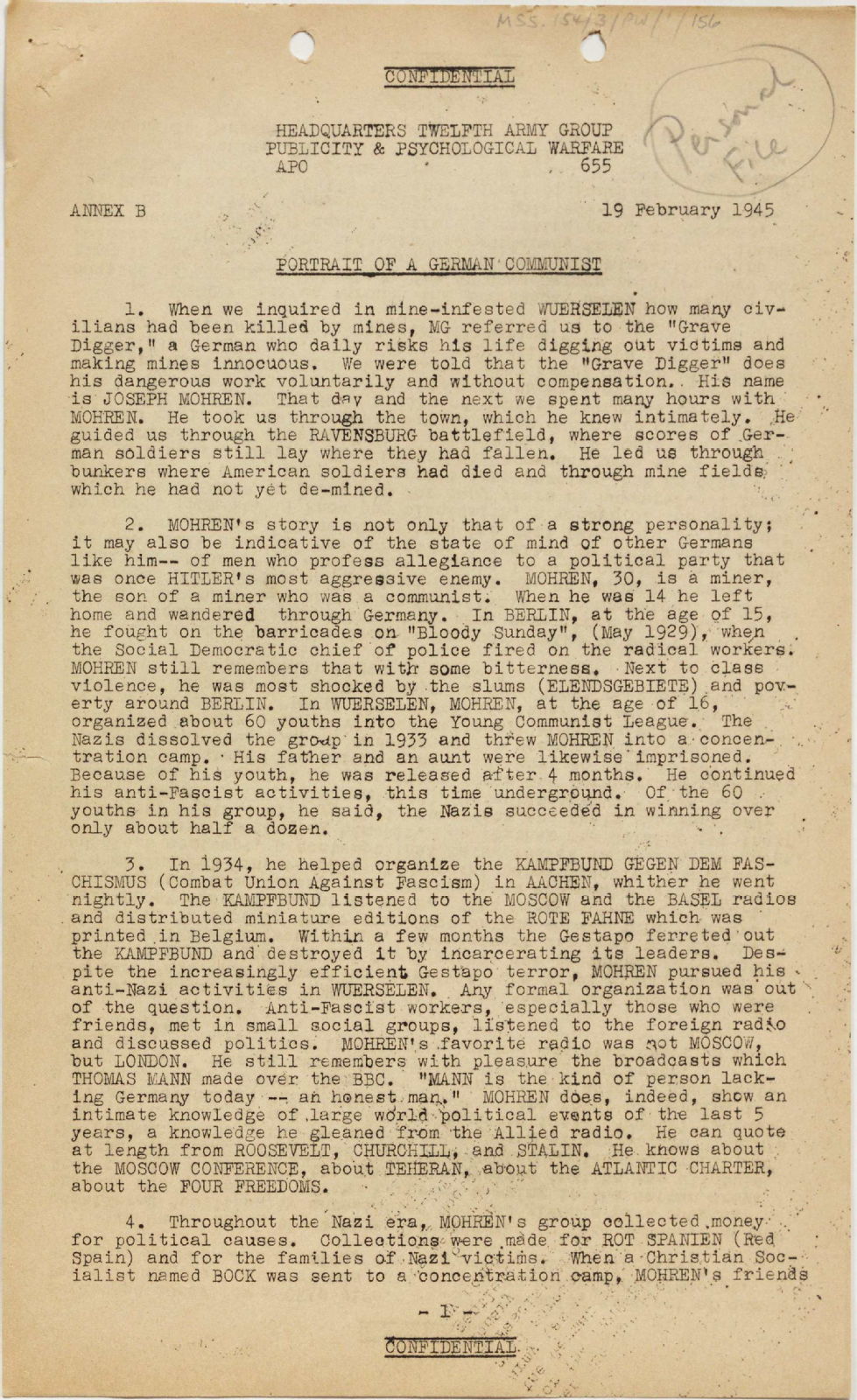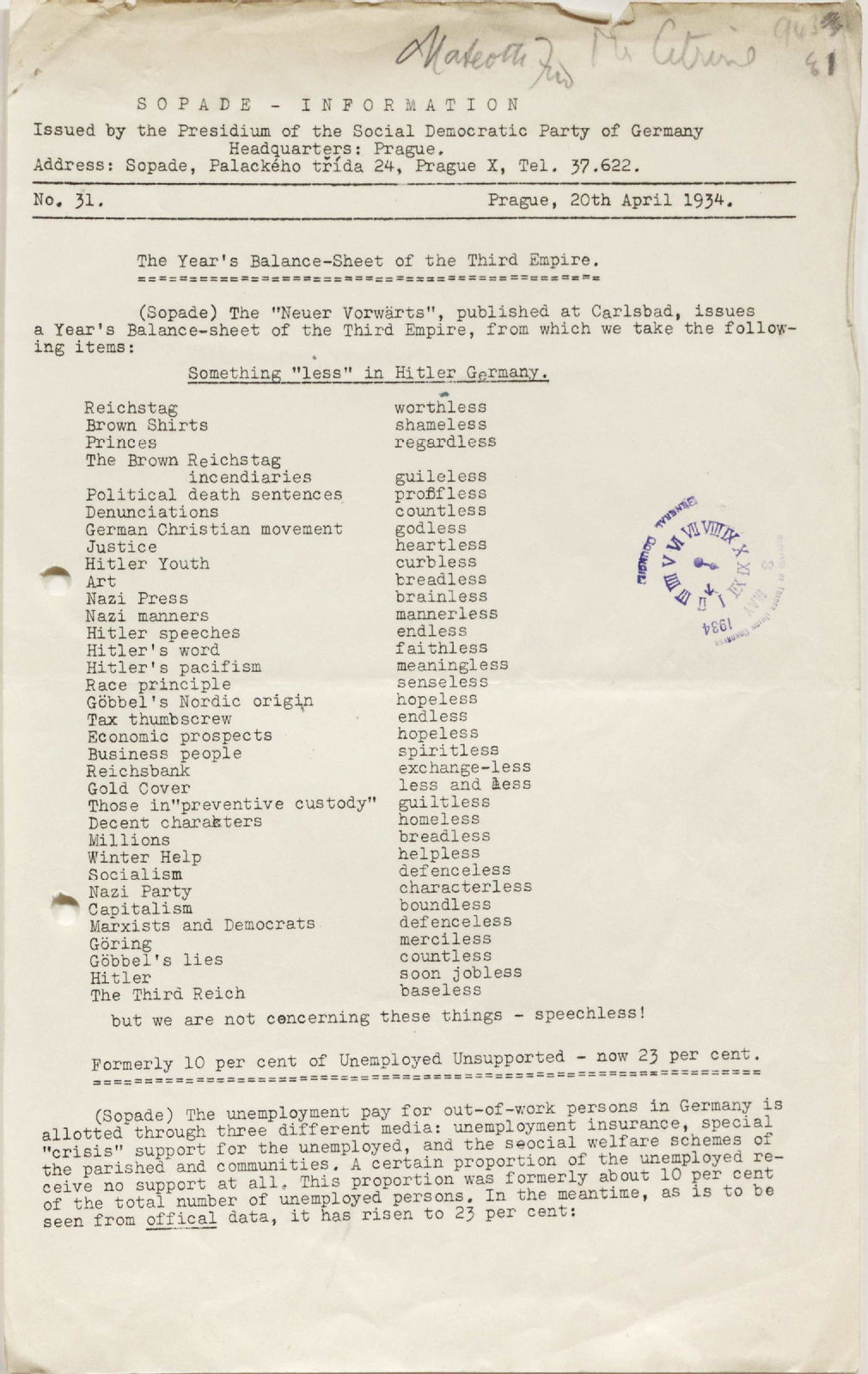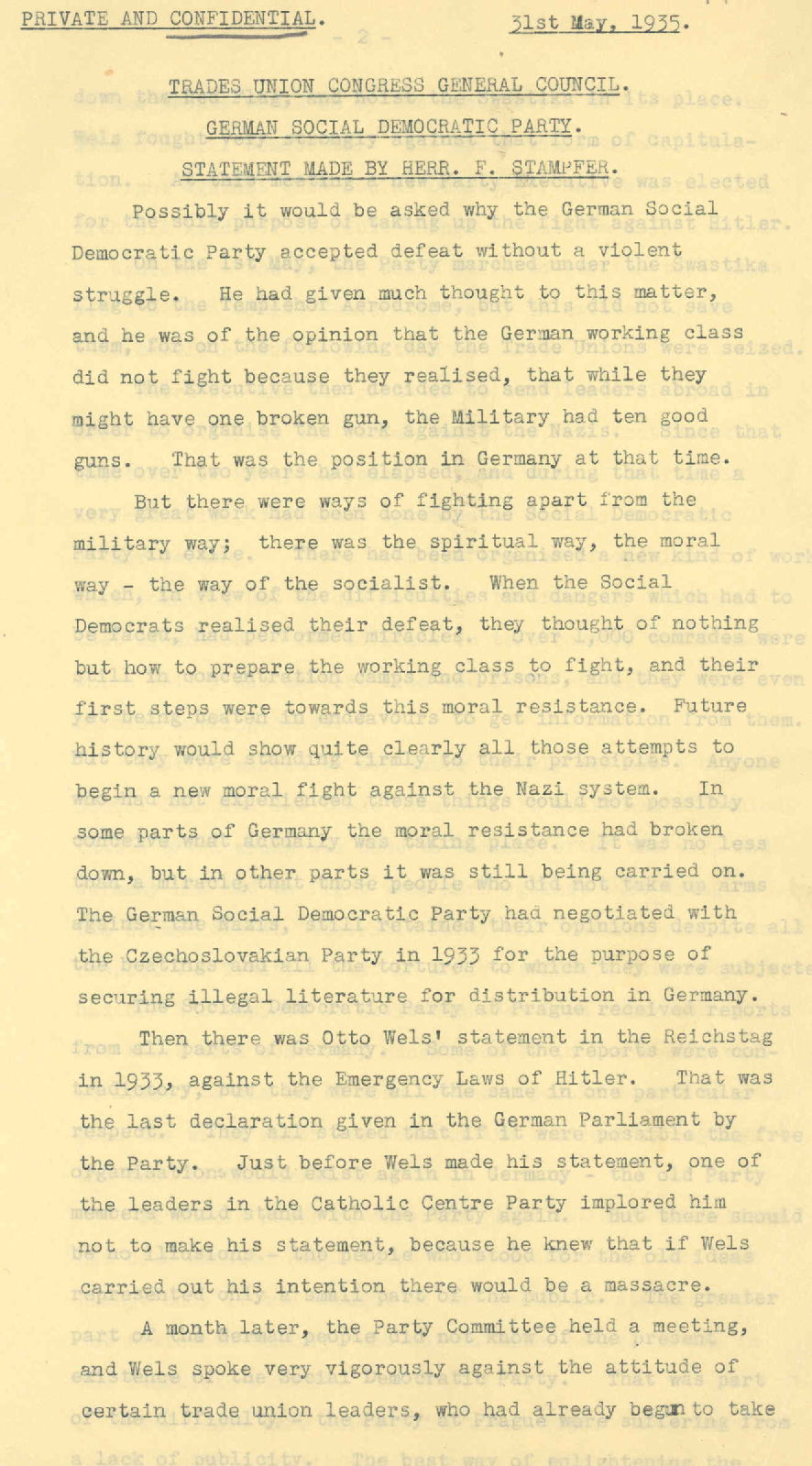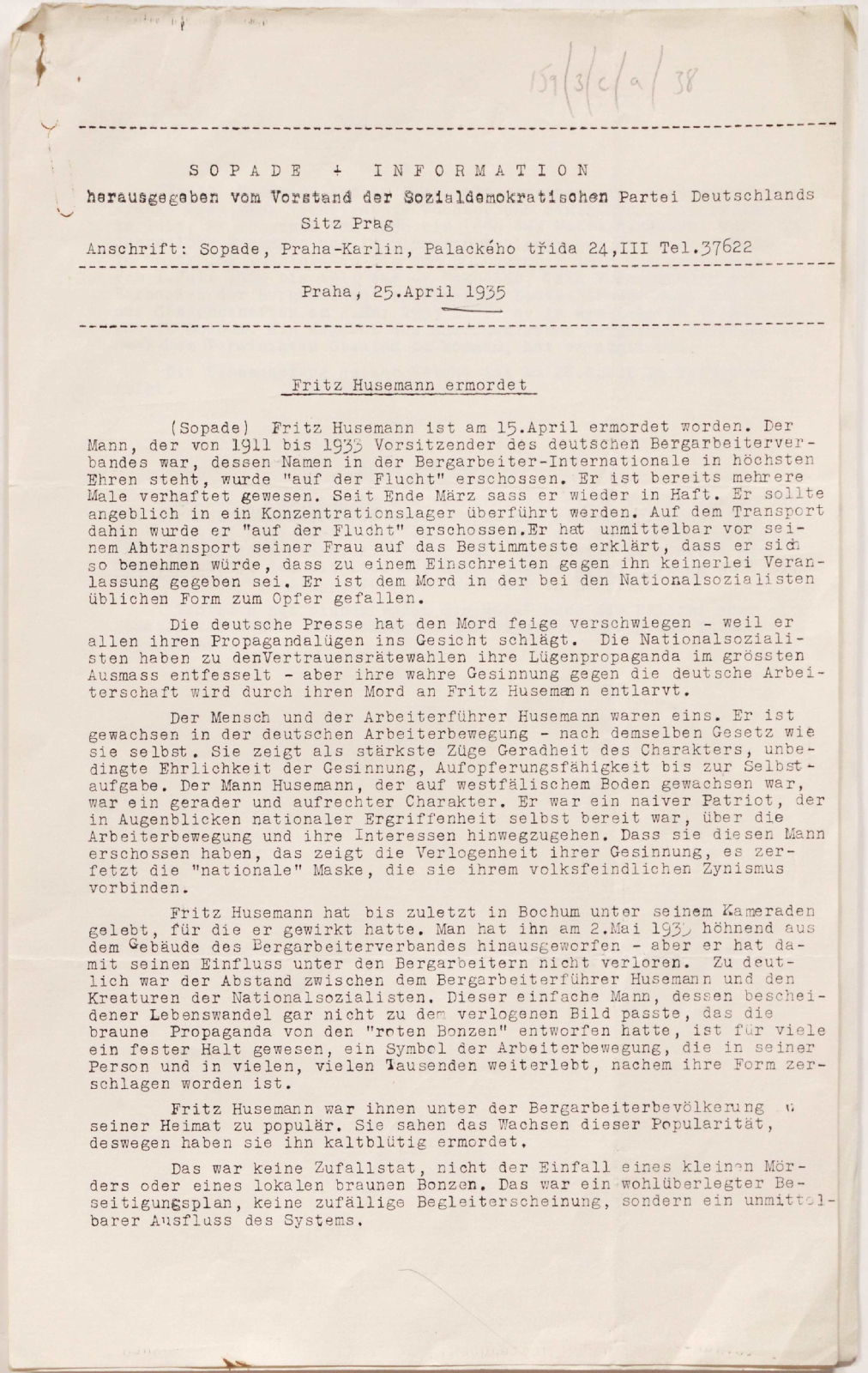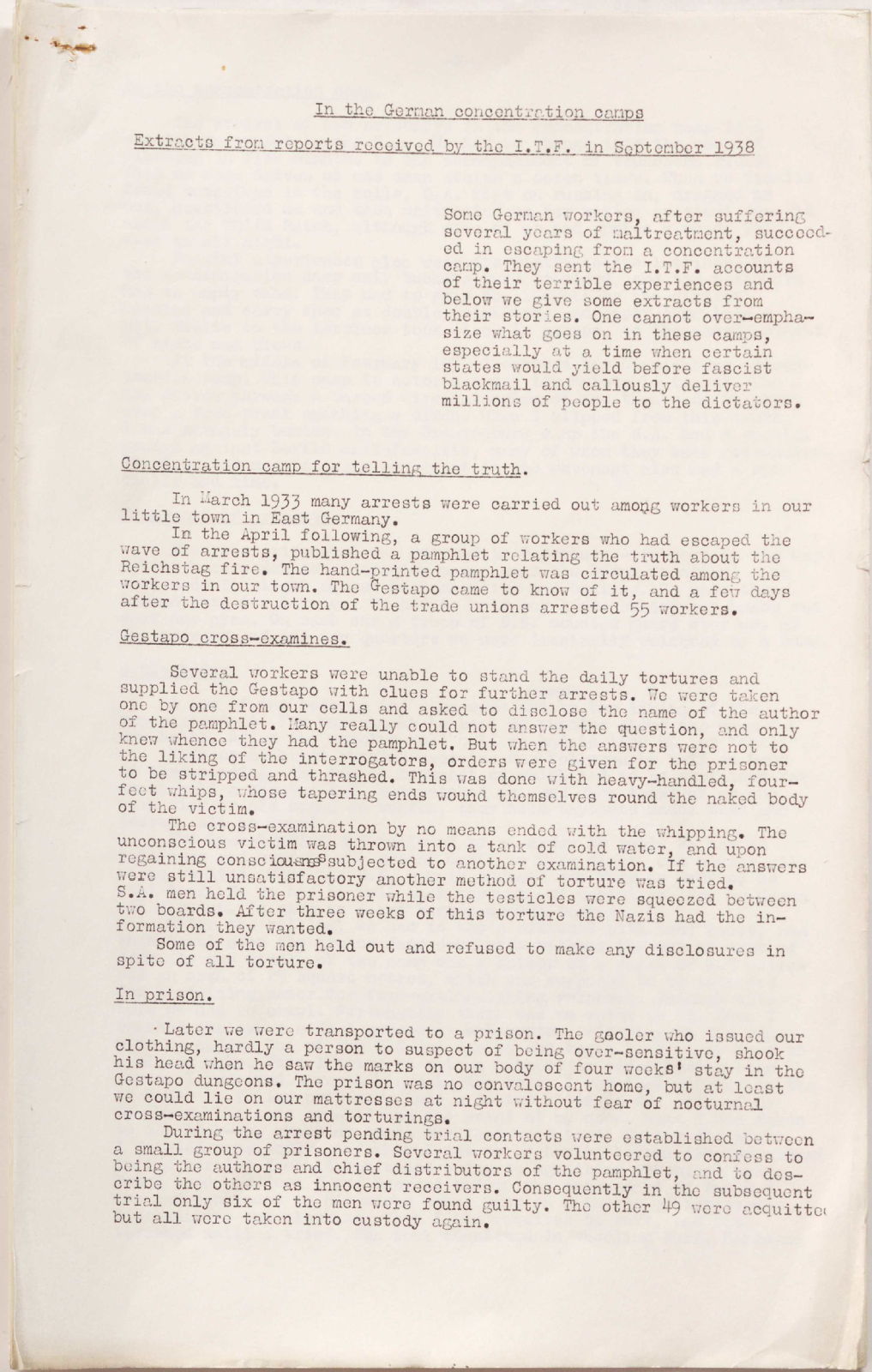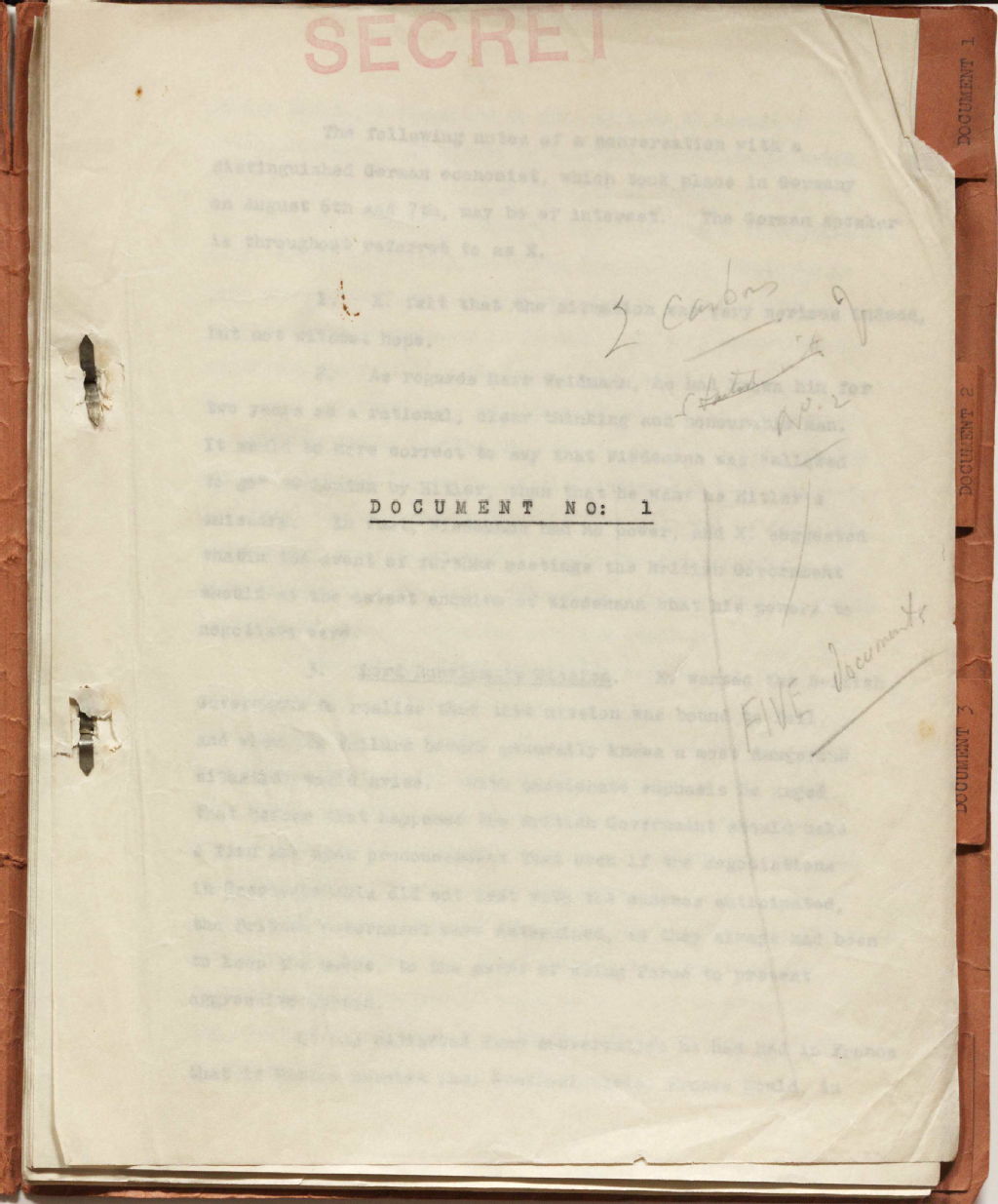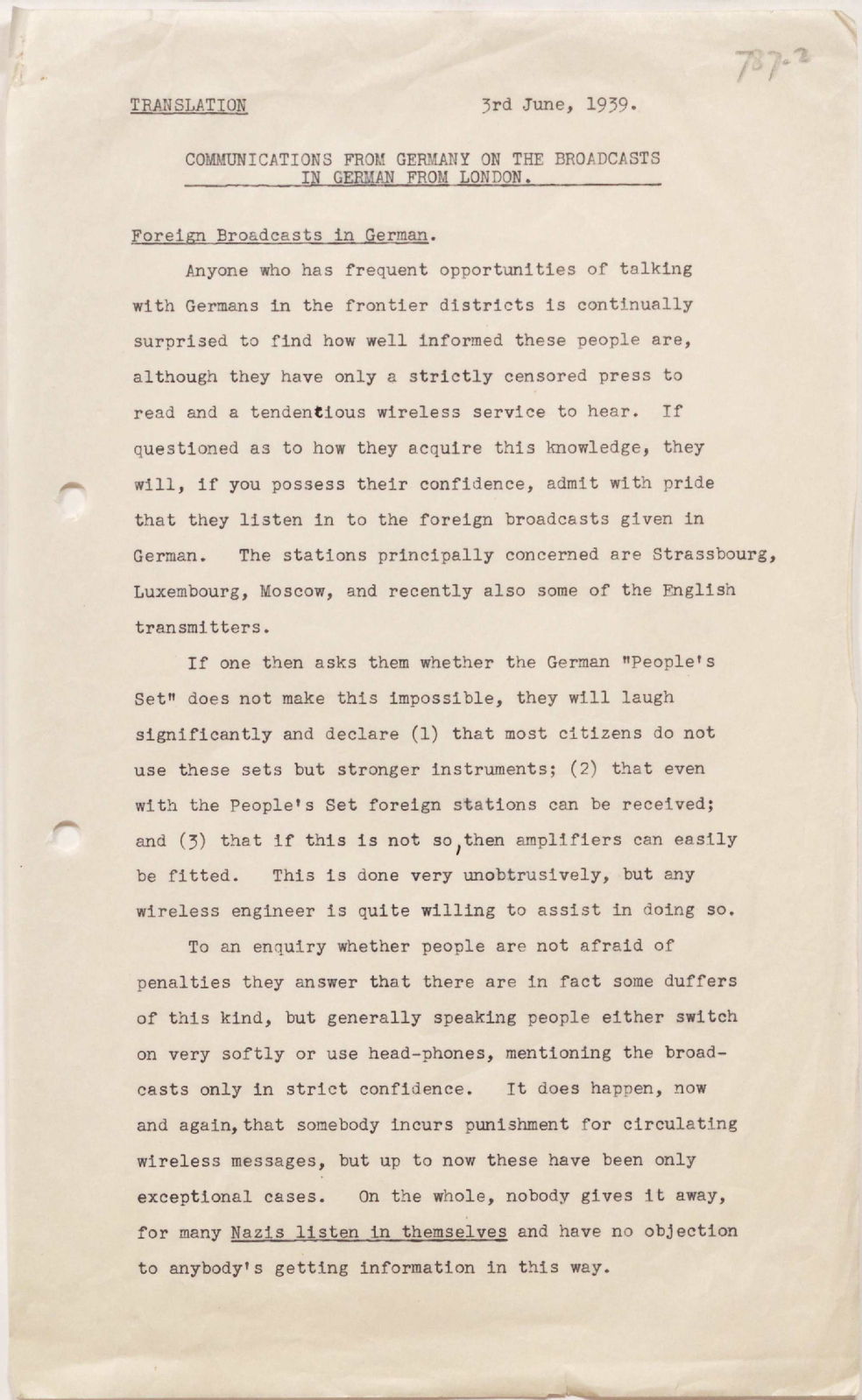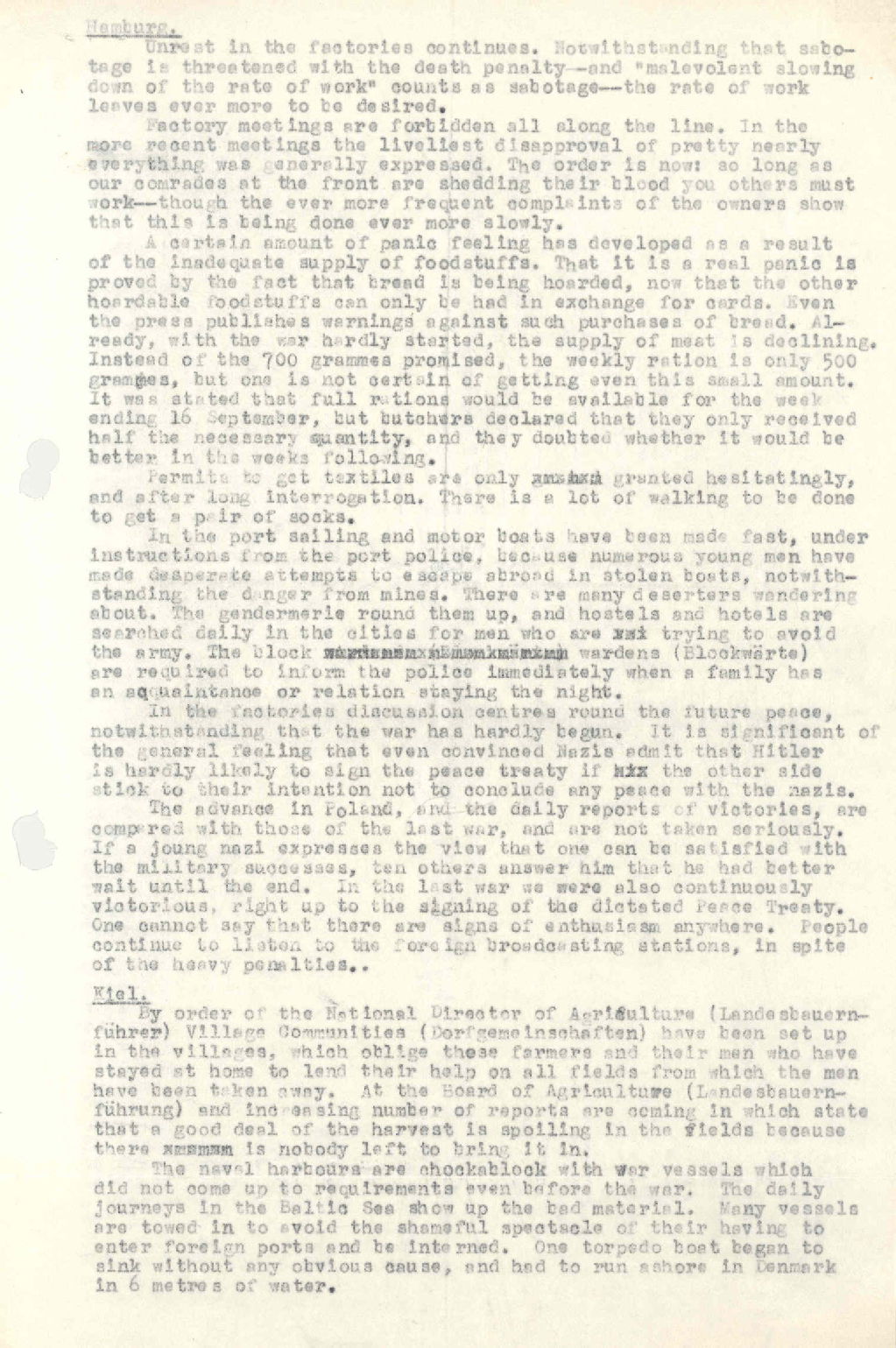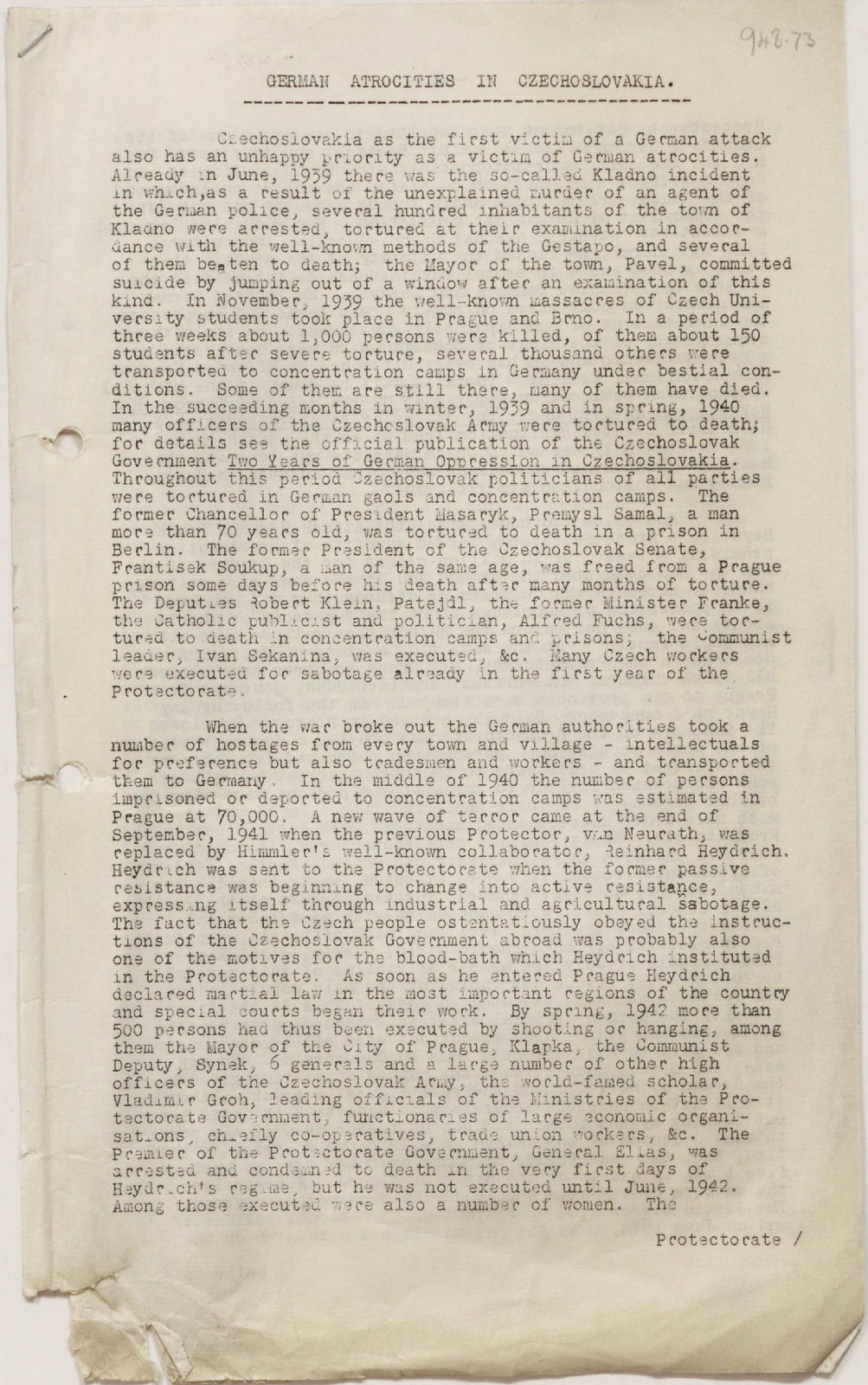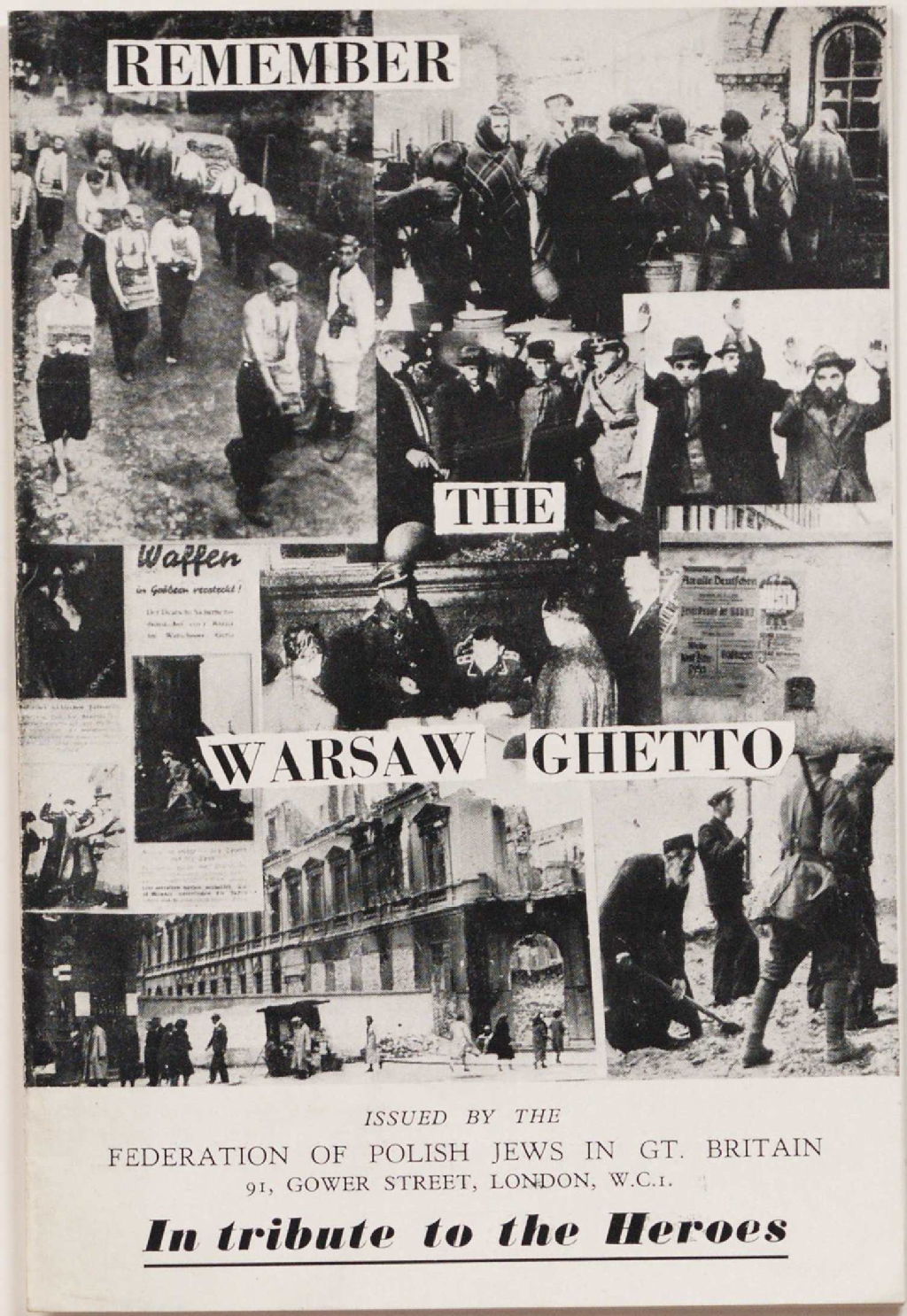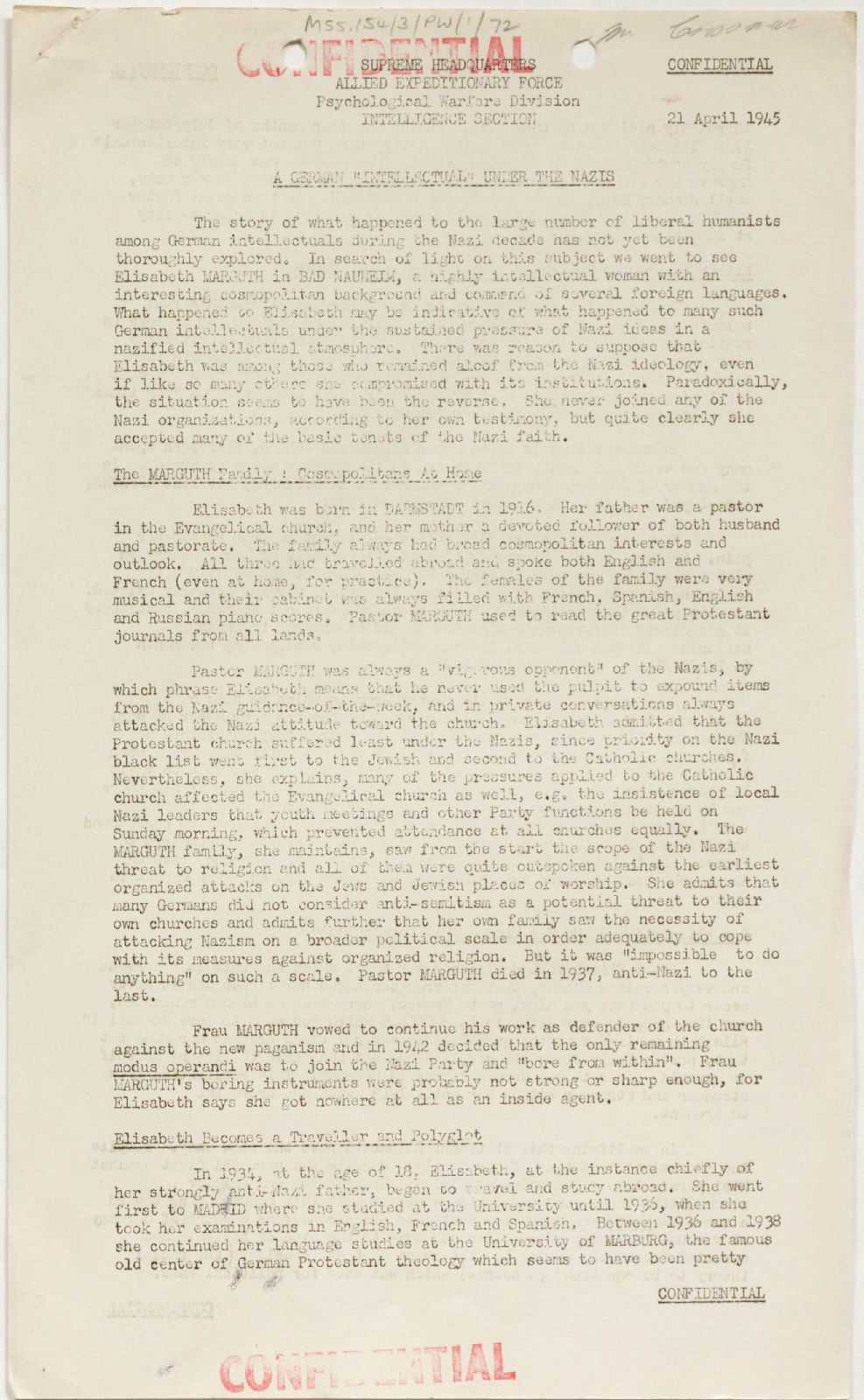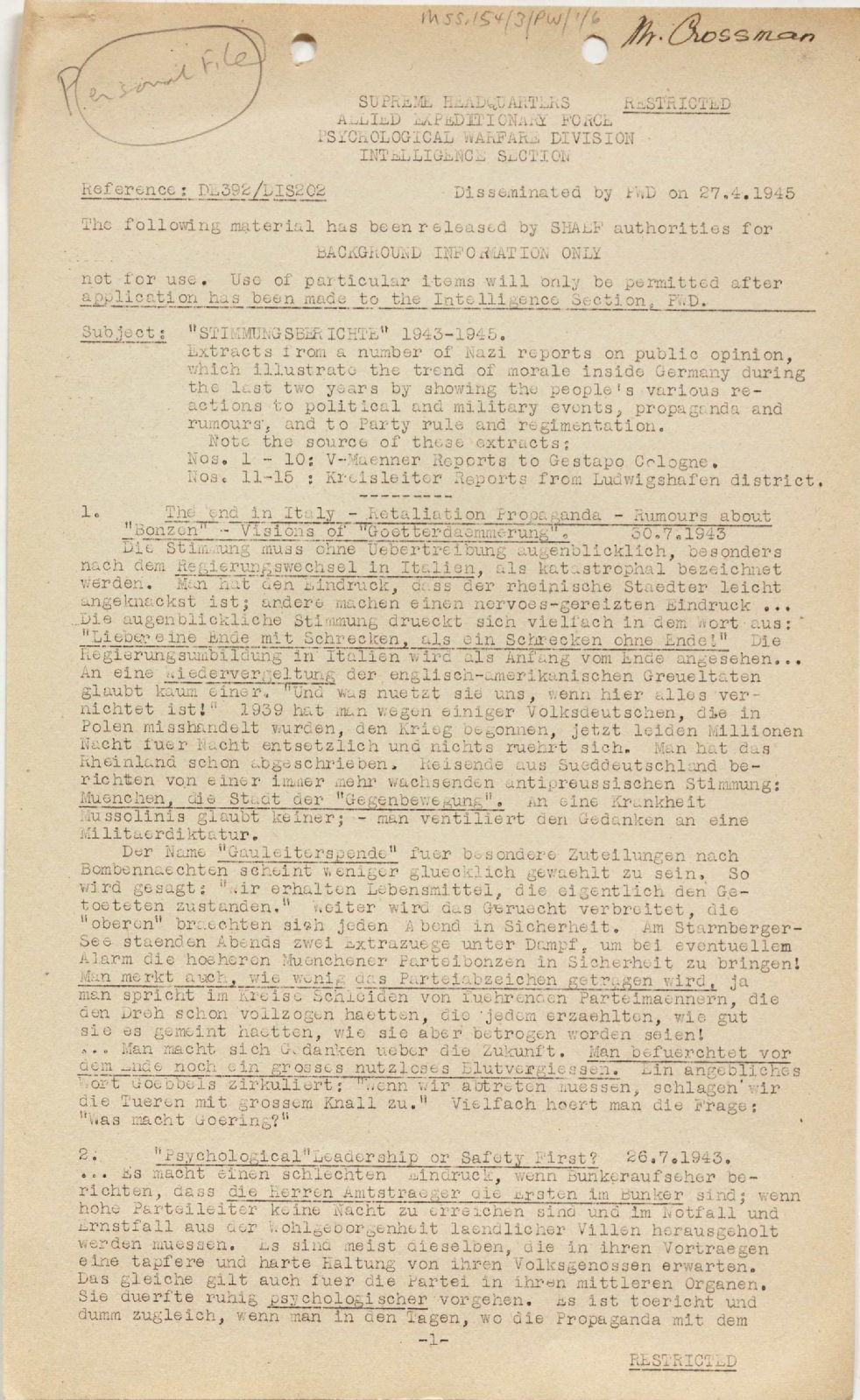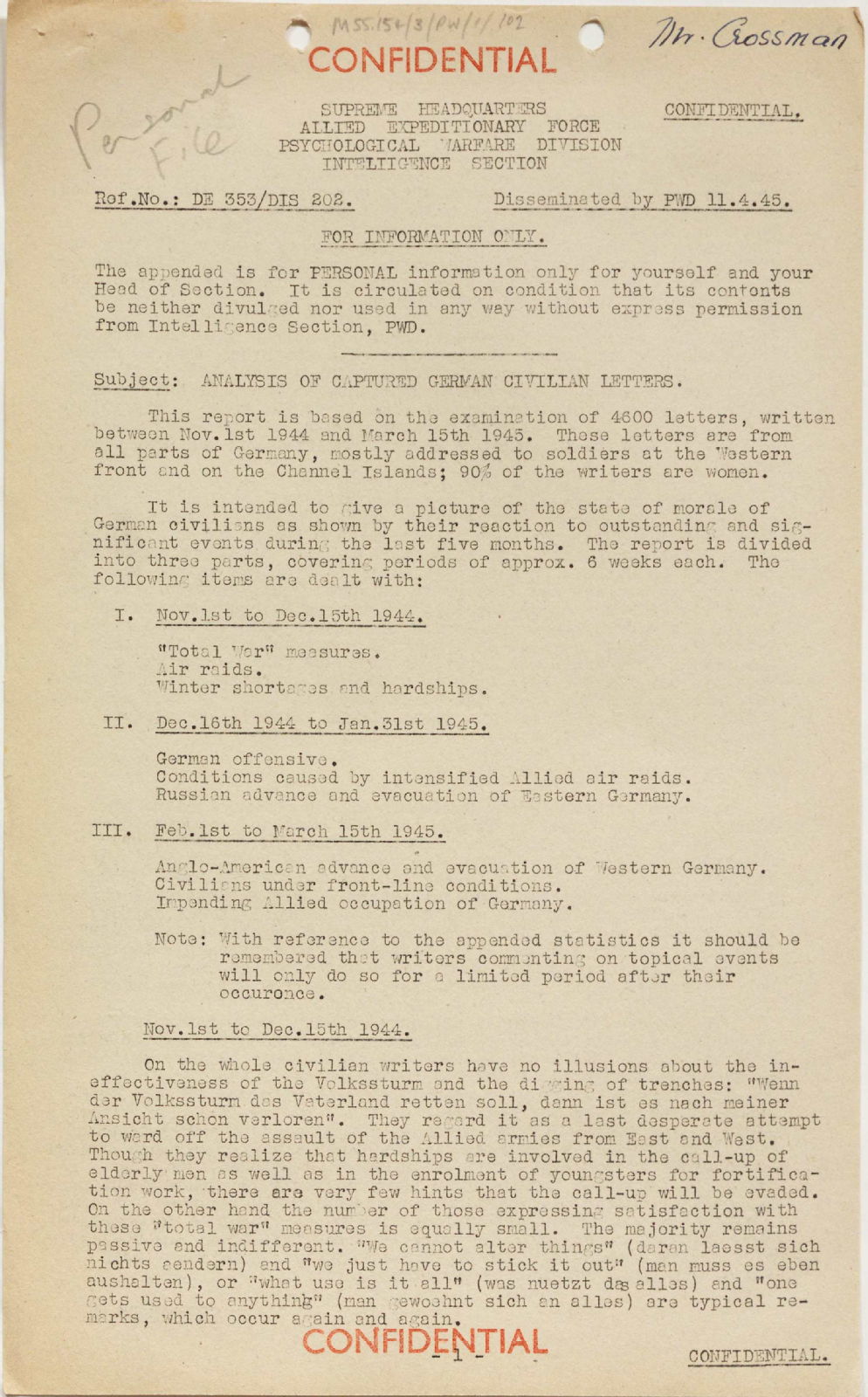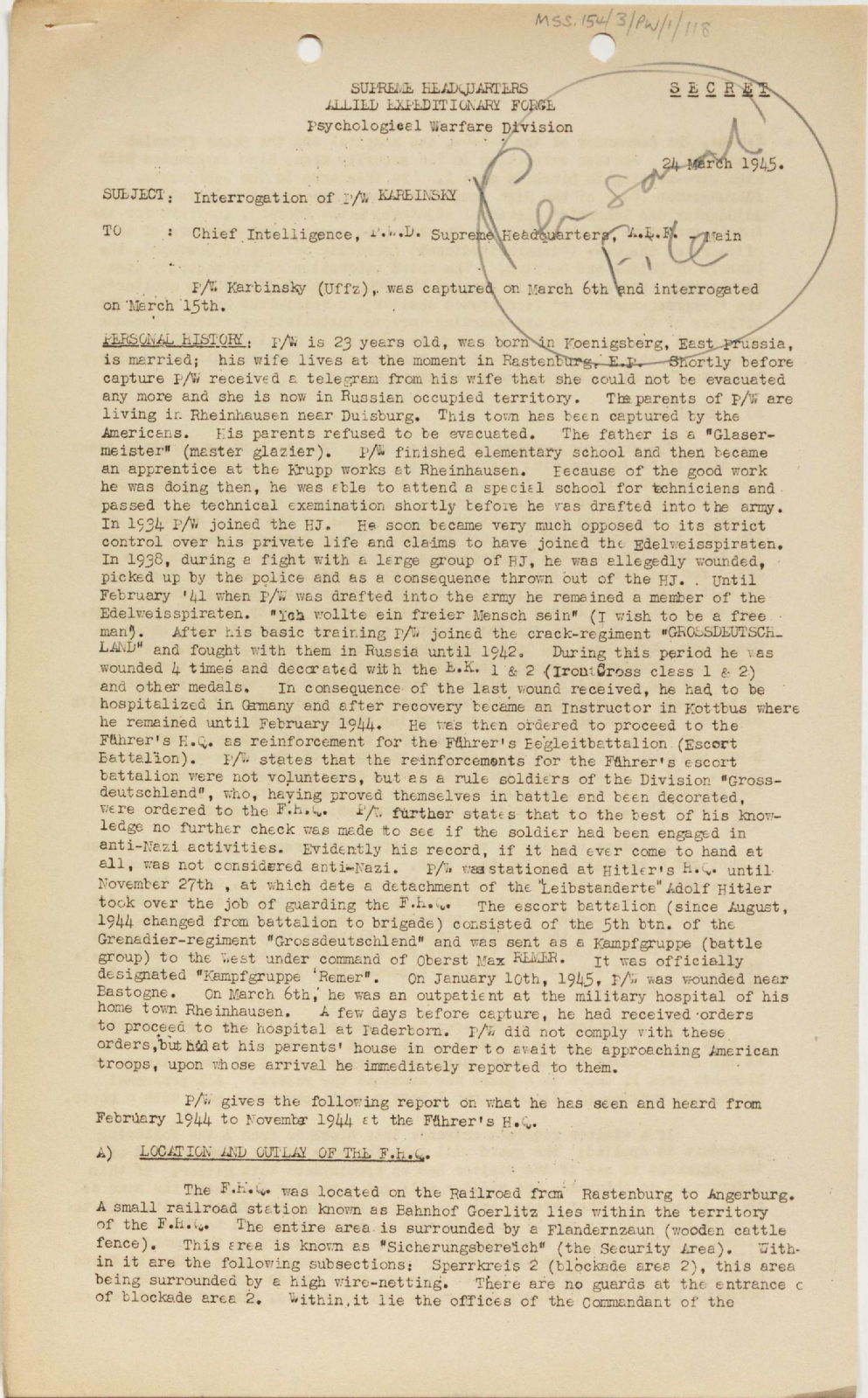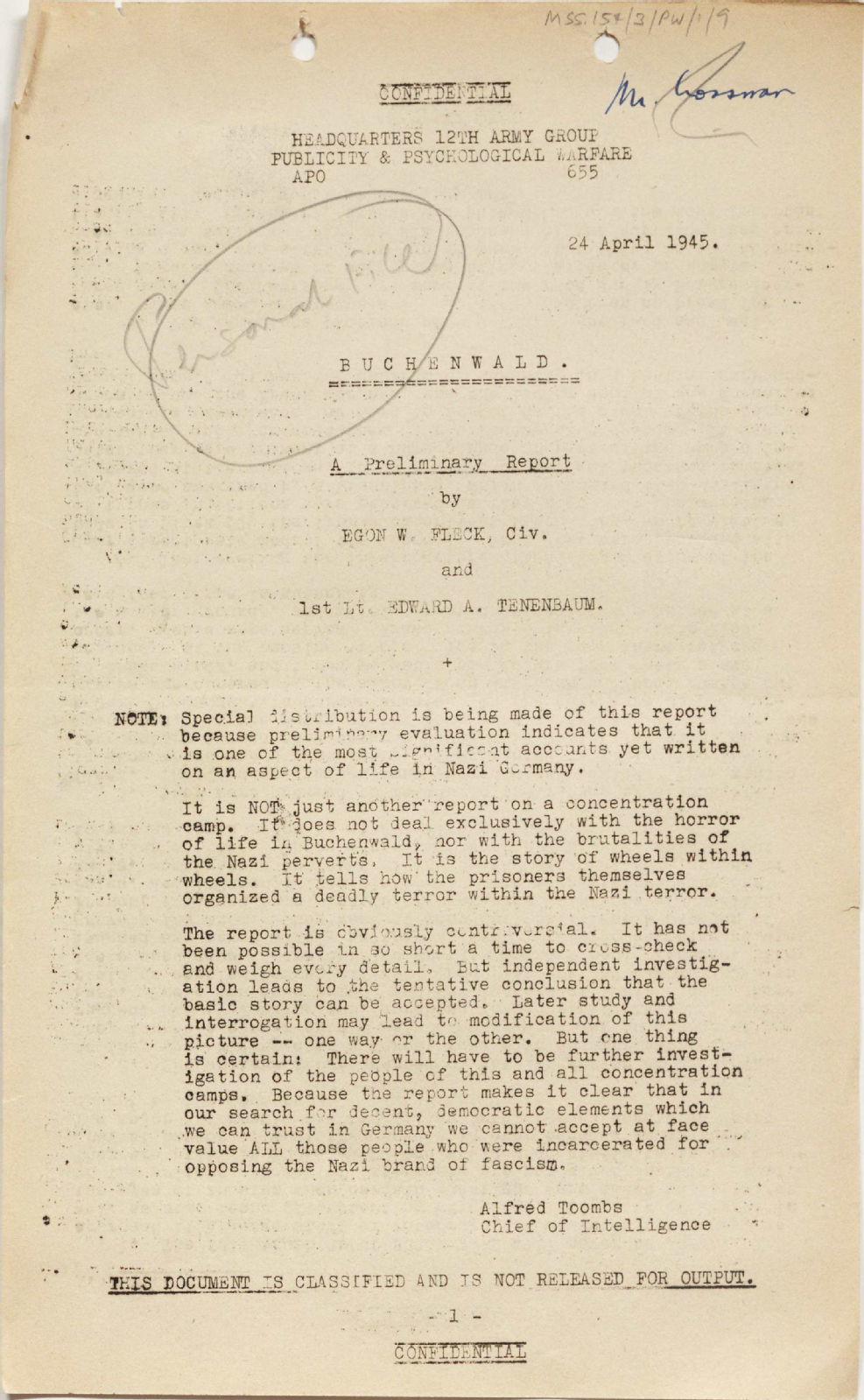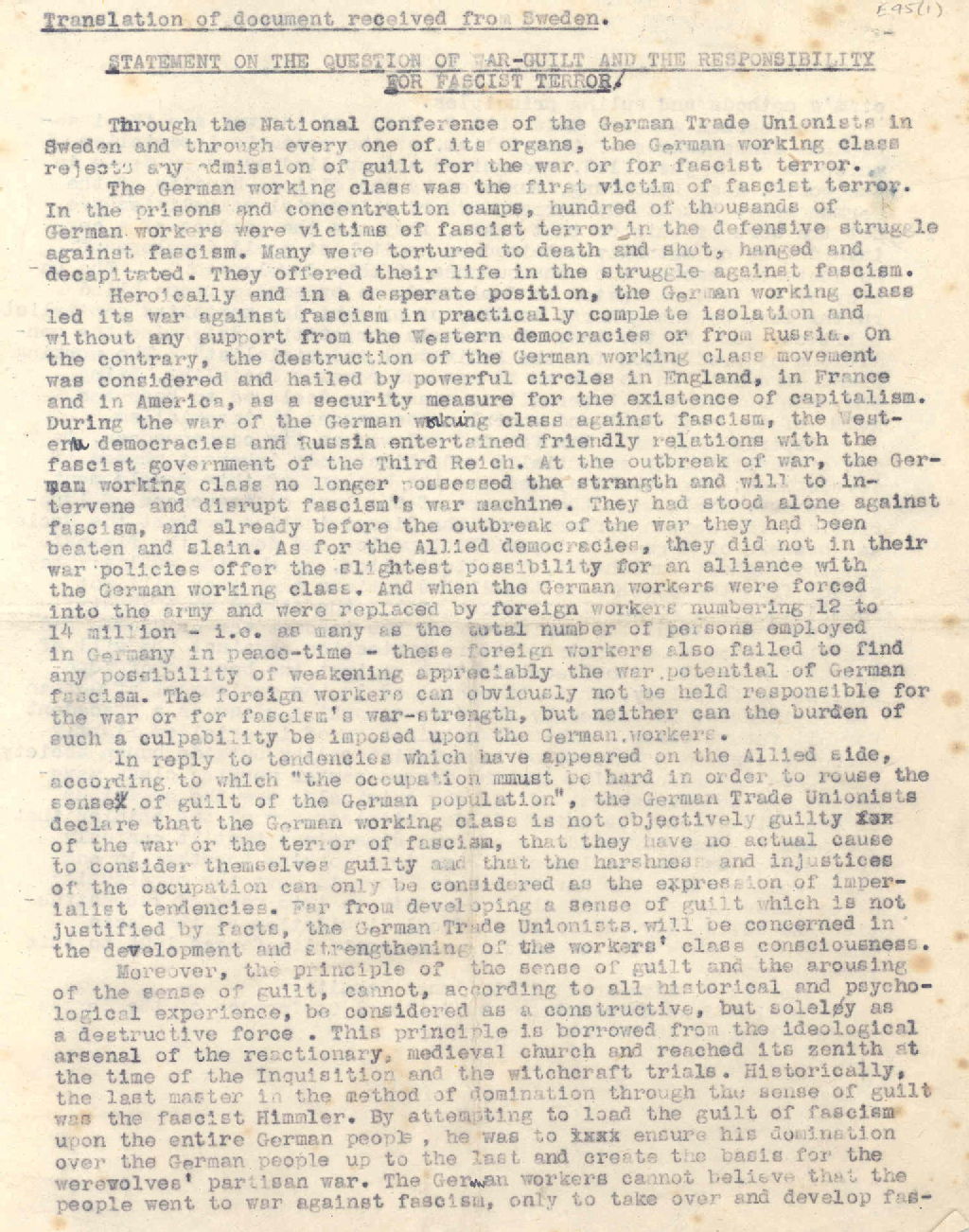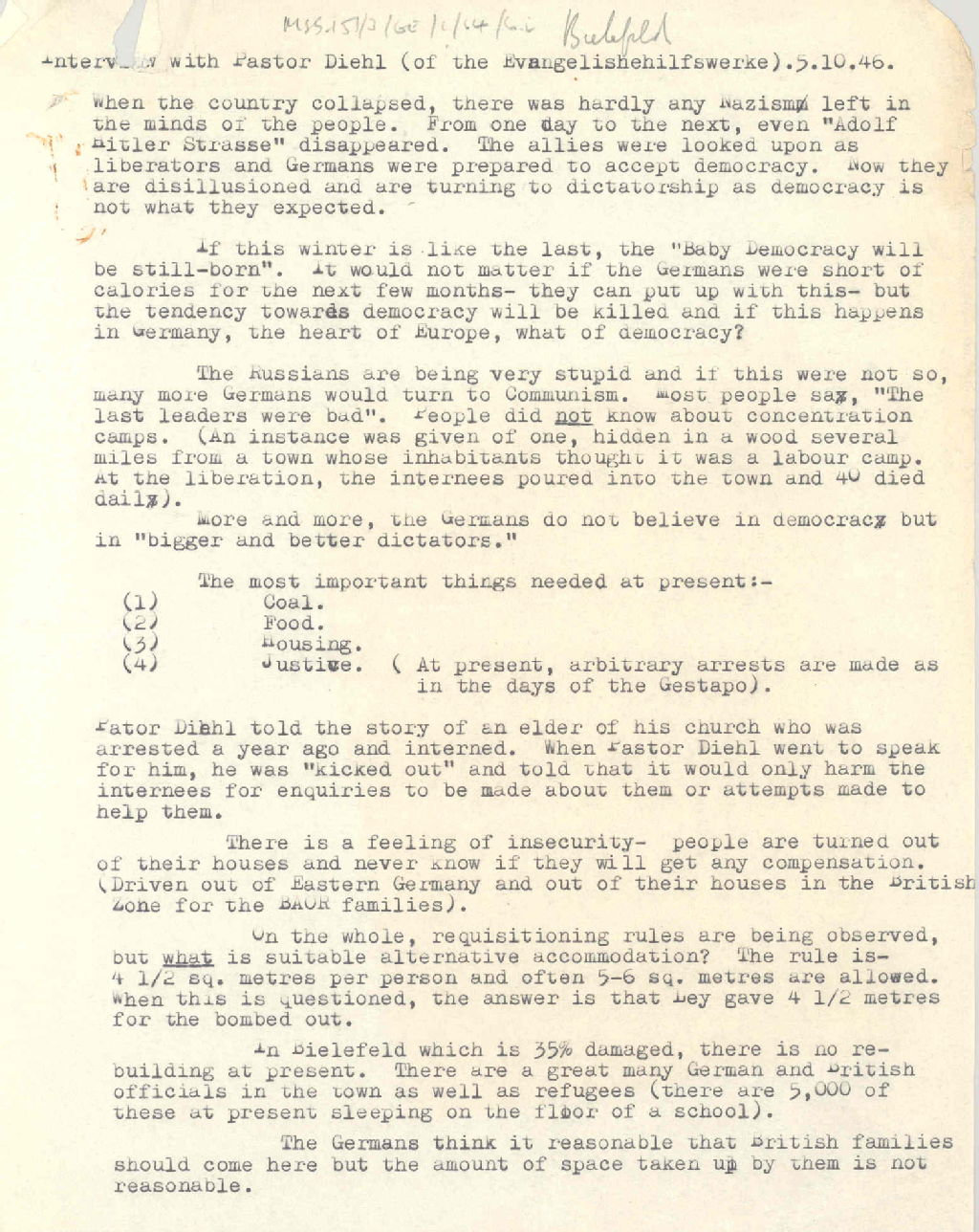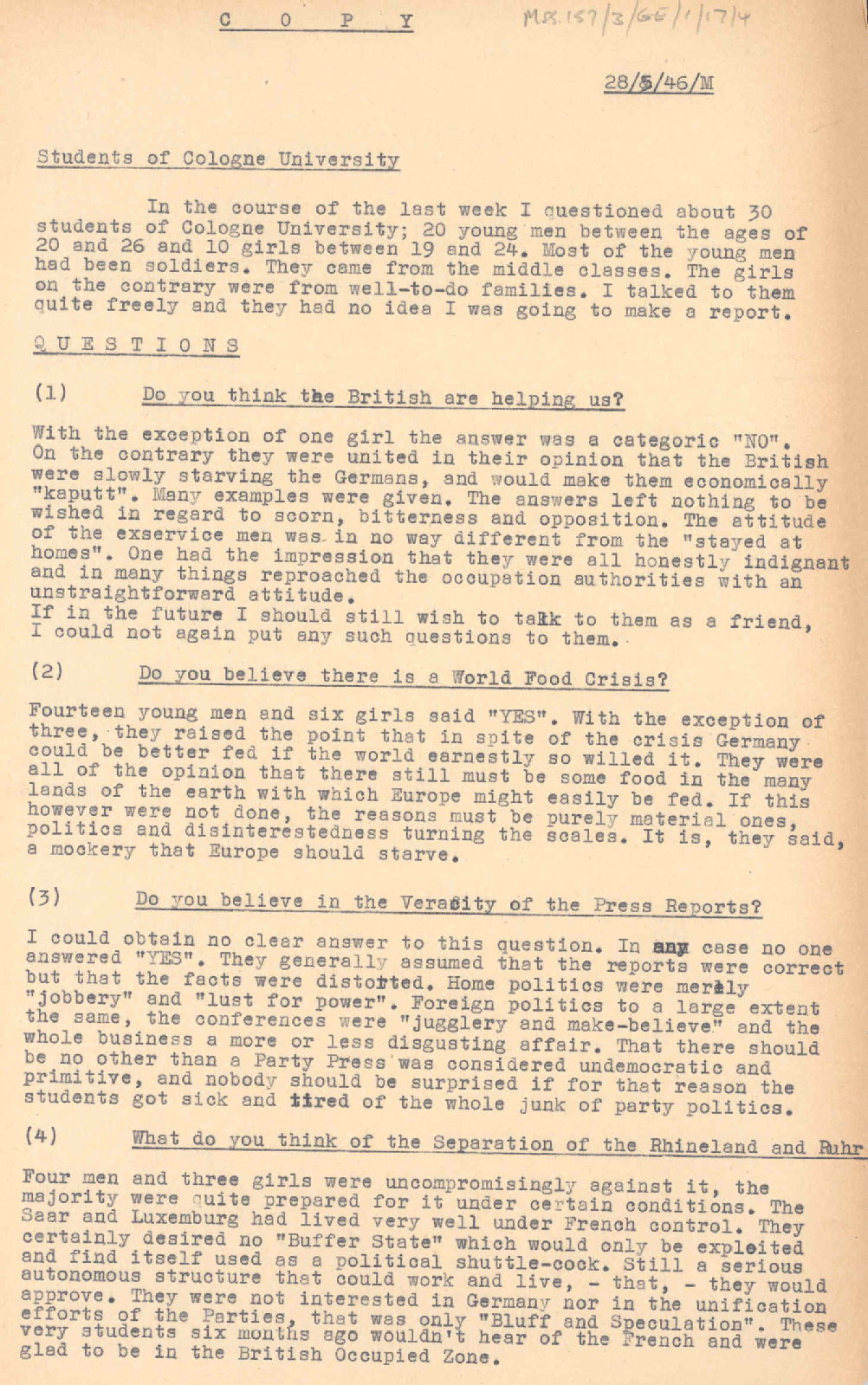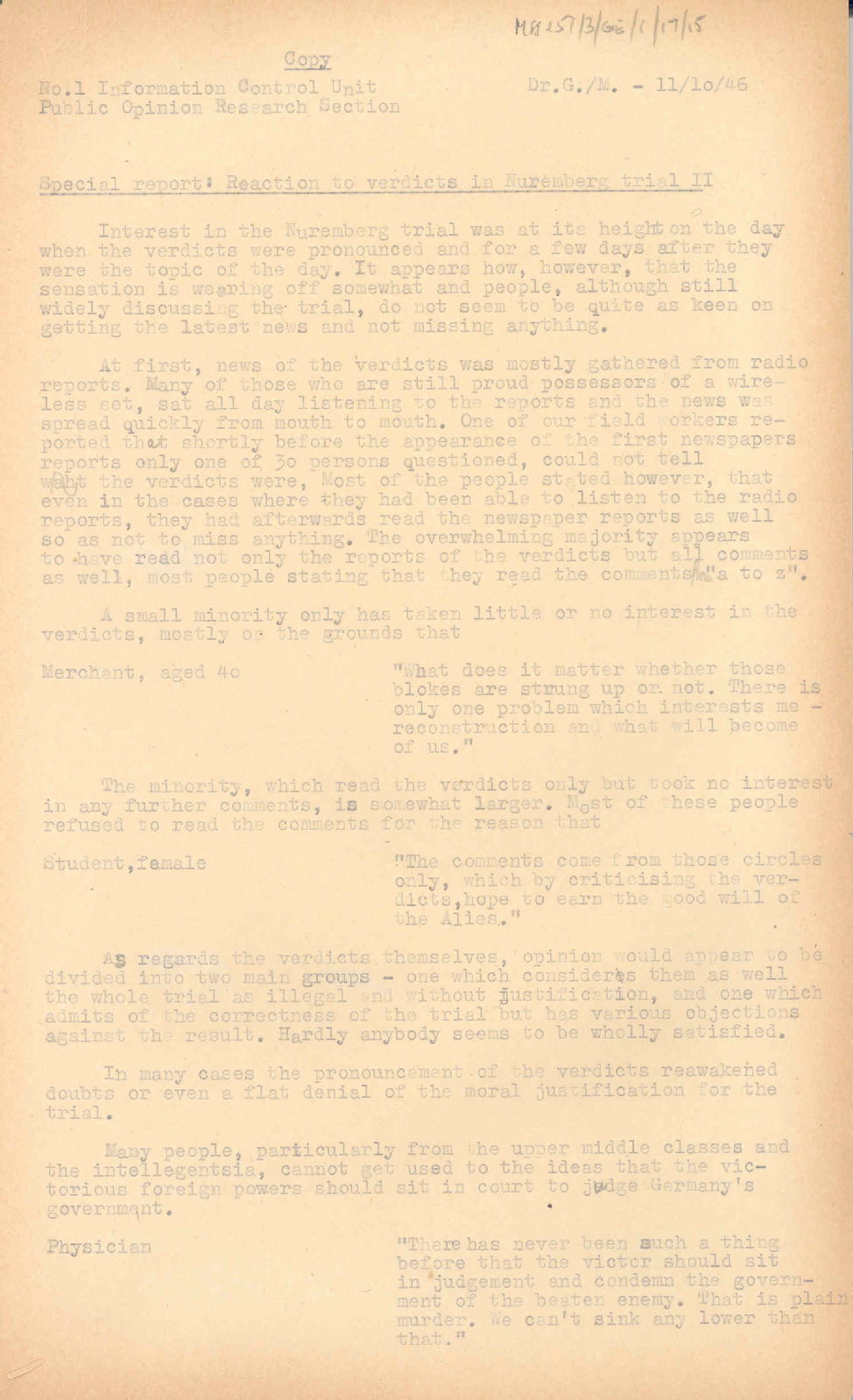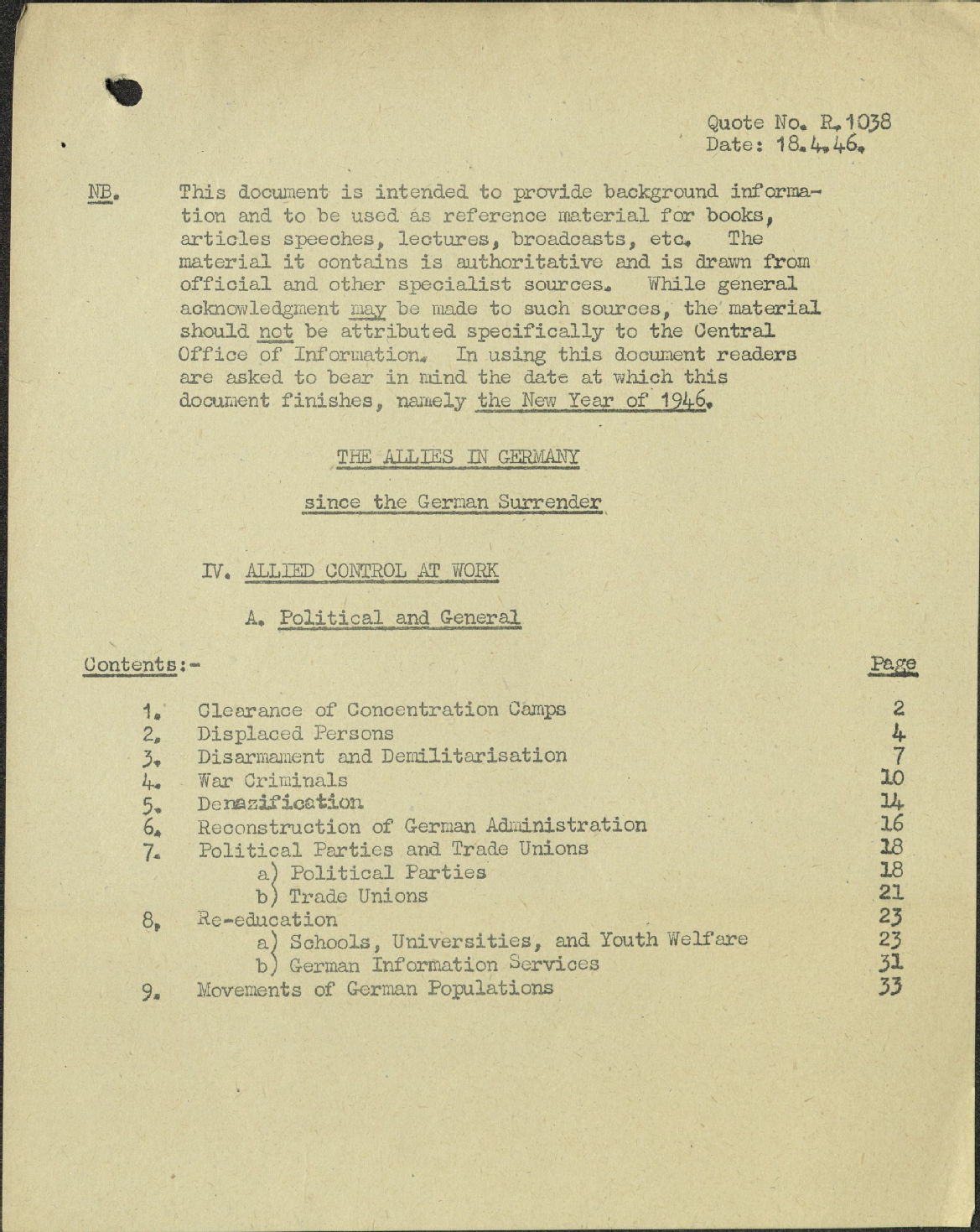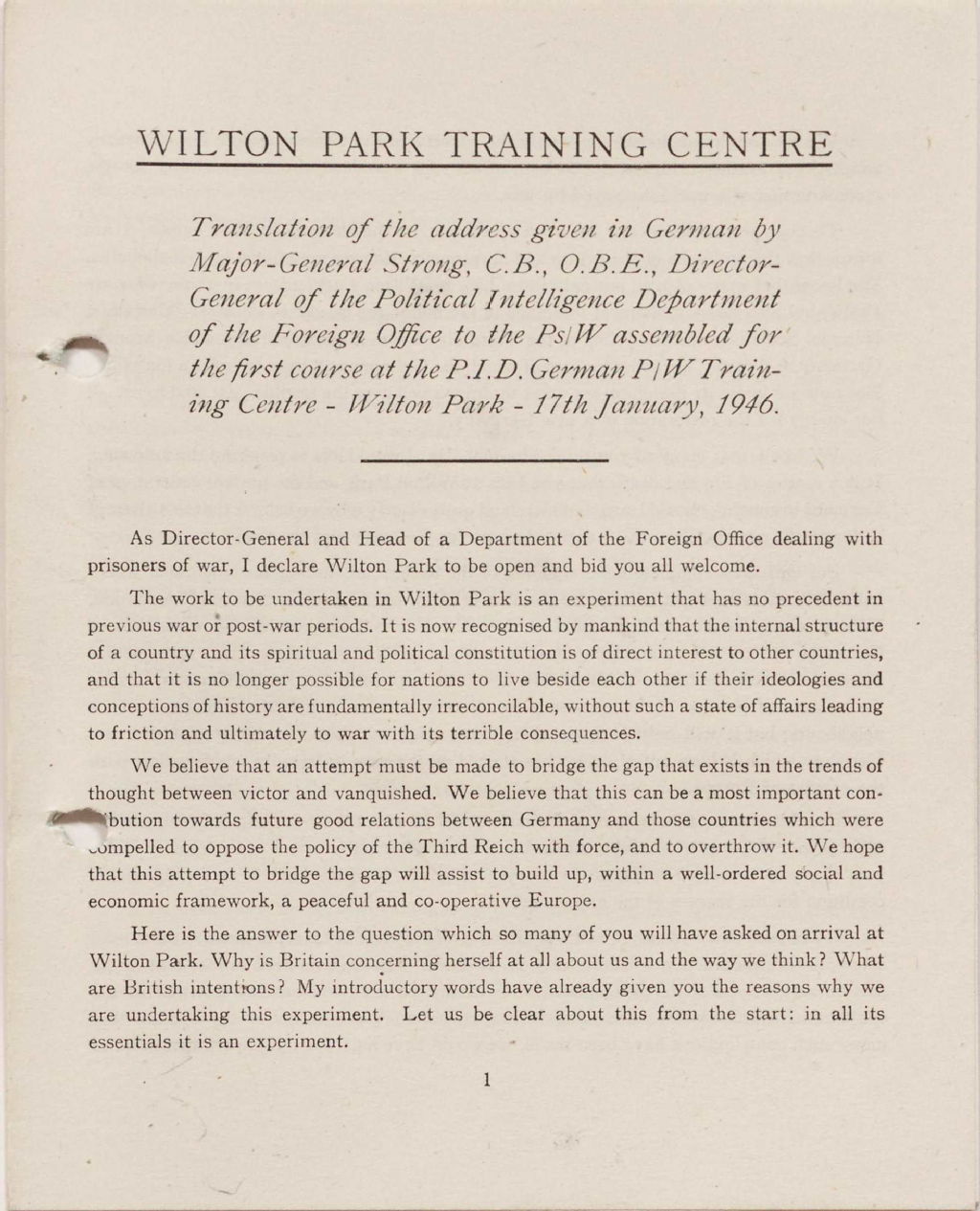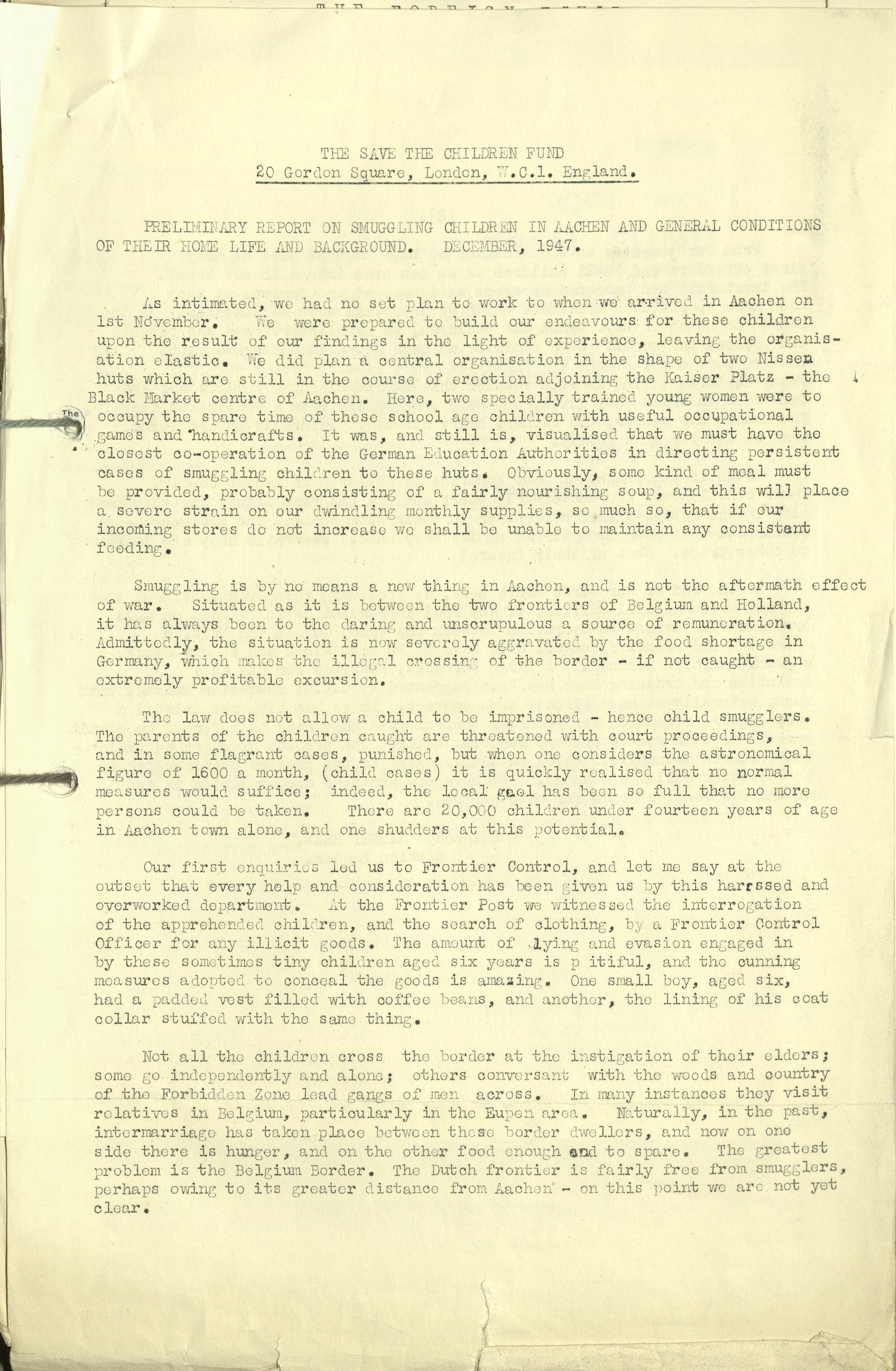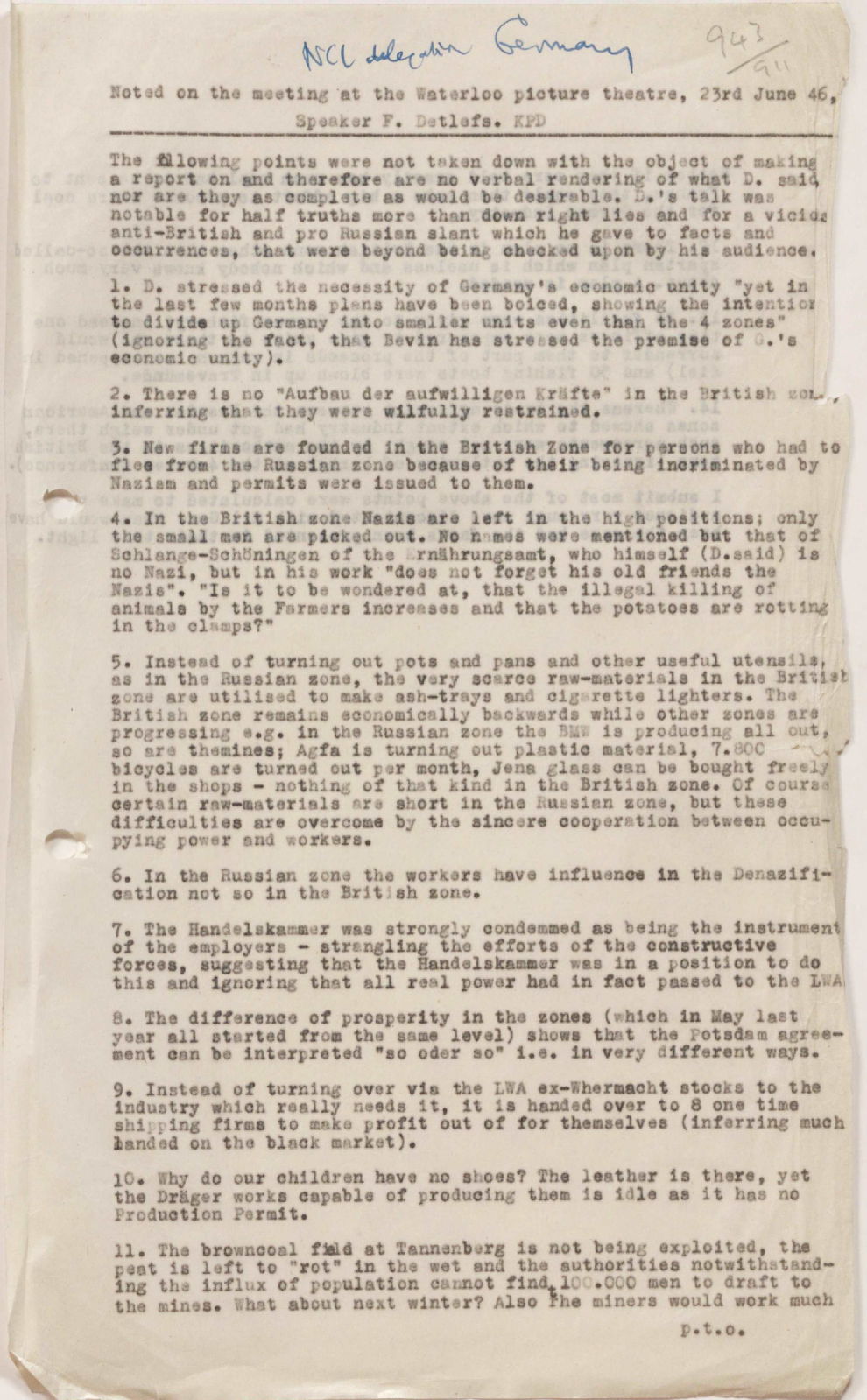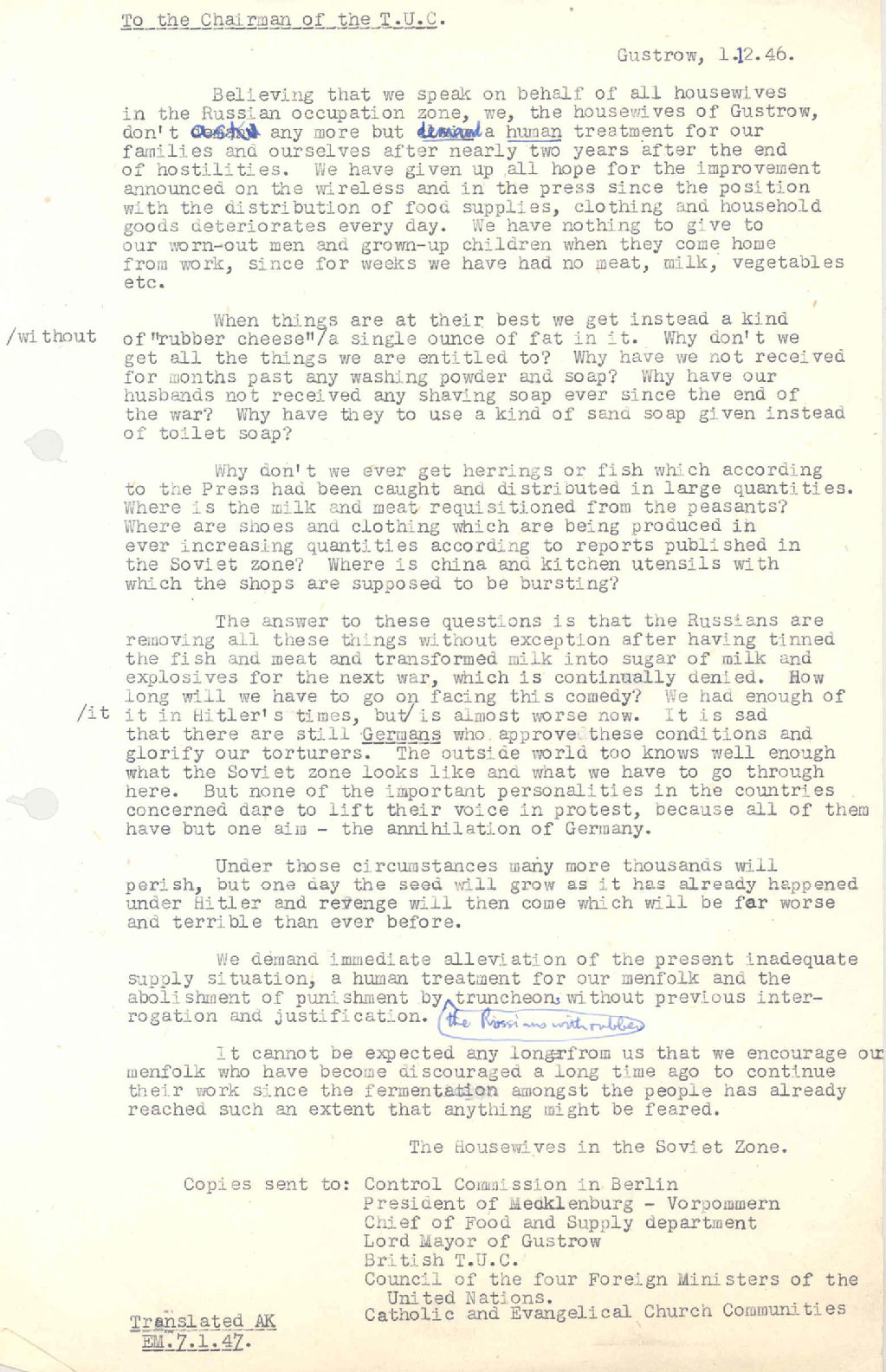History of Germany (HI290)
The Modern Records Centre holds nationally important collections for the study of political, social and economic history. Just a small selection of documents relevant to the course 'The History of Germany' are shown below. Click on the thumbnails to see the documents in full.
Most archive collections at the Centre come from trade unions, employers' organisations or individuals involved in the labour movement. Many of the documents therefore reflect the attitudes and opinions of the political left.
'Ready-made' searches of the archive catalogue are available for several periods in German history: 1918-1932Link opens in a new window, 1933-1945Link opens in a new window, 1945-1960Link opens in a new window, and 1961-1989Link opens in a new window. The results of these searches are not comprehensive lists that show every relevant item in the Modern Records Centre, but instead show a selection of documents on particular themes. You can find information about other relevant archive material by searching our online catalogueLink opens in a new window or using our guide to sources on Germany between 1918-1950Link opens in a new window.
Publicity brochures for ten key German films from 1931-1945 (including 'Triumph of the Will') have been digitised for the module Film in the Weimar Republic and under National SocialismLink opens in a new window.
Years of crisis, 1918-1923
'Proclamation of the German Republic to the returned soldiers', 22 November 1918
Proclamation from the Committee of the People's Council, hailing residents of Germany "as the freest of them all", now that "the revolution has broken the spell".
Included in a file on 'Germany', 1918-1925, from the archives of the Trades Union Congress; document reference: MSS.292/943/1.
The German Spartacists: their aims and objects, 1919
Translation of the official declaration of the Spartacist Union, published in Britain by the British Socialist Party. It argues that only revolutionary socialism is "capable of leading society out of the terrible economic chaos which the imperialist orgy has left in its wakeLink opens in a new window" and explains the Spartacists' view of how the new society should be ordered.
From the Maitland-Sara-Hallinan collection; document reference: MSS.15X/2/63/7.
Members of the Red Army in Rhineland and Westphalia "after the reactionary "Kapp Plot"", c.1920
From the archives of Frank Maitland and Henry Sara; document reference: MSS.15B/6/4/9.
Retail trade prices of the most important necessaries of life in 1914 and 1921
Statistics compiled by the Bavarian government, showing the effects of post-war inflation on the price of food, heating, clothing, etc.
Included in a file on Germany, from the archives of the Iron and Steel Trades Confederation; document reference: 36/G11.
On the Silesian question and unrest in Germany, 1921
Report by Mr E.L. Poulton, member of an international trade union delegation appointed to visit Germany at the time of the plebiscite in Upper Silesia (a vote to determine whether the territory would be part of Germany or Poland). He describes being caught up in the unrest on the streets of Breslau and Berlin, and being temporarily detained by the police after being suspected of criminal or political offenses.
Included in a file on Germany, 1921-1934, from the archives of the Trades Union Congress; document reference: MSS.292/943/2.
Deutsche Werke and Inter-Allied Commission, 1922
Report by Arthur Pugh submitted to the International Committee of the Trades Union Congress. He describes his visit to Germany to witness the "demolition of buildings and machinery designed to make munitions of war", and reproduces an appeal from soon to be unemployed members of the Works Council at the Deutsche Werke in Erfurt, where guns used for sport and hunting were manufactured. They argue that "the whole of the German workmanship does not think of ever manufacturing again war material or to take part in warLink opens in a new window", but that "if everything points to our destruction and if we have to be turned into slaves it is quite obvious that such disappointed people is likely to defend to the uttermostLink opens in a new window".
Included in a file on the Peace Treaty Revision, 1918-1925, from the archives of the Trades Union Congress; document reference: MSS.292/940/3.
Germany's economic and financial situation: An exhibit of after-effects of the World War, 1923
Detailed outline of the economic and financial situation in Germany, produced by the Reich Statistical Office (Statistisches Reichsamt) in Berlin, part of the German Ministry of Economic Affairs (Reichswirtschaftsministerium). It includes information about the effects of the Versailles Treaty on Germany and international trade, and counters accusations of financial extravagance.
Included in a file on Germany, from the archives of the Iron and Steel Trades Confederation; document reference: 36/G11.
The Ruhr: the report of a deputation from the Transport and General Workers' Union, 1923
Report of a British trade union delegation appointed to enquire into the conditions in the Ruhr district of West Germany following the French military occupation. The deputation interviewed leading figures on all sides, including the future West German Chancellor Dr. Konrad Adenauer, then Oberburgomaster of Cologne. It includes analysis of the economic conditions, comment on the impoverishment of the German workersLink opens in a new window, condition of the professional classesLink opens in a new window and the "workers' resistanceLink opens in a new window", and an account of encountering the "rebel" Communist armyLink opens in a new window.
Included in the archive of the Union of Communication Workers; document reference: MSS.148/UCW/6/13/17/65.
'The lessons of the German events', 1924
Official report of the inquest by the Communist International into the failed revolution and "great defeat of the Party" in Germany in September and October 1923. It includes statements by leading figures in the Communist Party of Germany and an outline of the "revolutionary crisis in GermanyLink opens in a new window" and the Party's failures in Saxony.
From the Maitland-Sara-Hallinan collection; document reference: MSS.15X/2/99/12.
Rise of extremism, 1923-1933
Photograph of "Hitlertruppen" [Hitler troops] in Bavaria, September 1923
From the archives of Frank Maitland and Henry Sara; document reference: MSS.15B/6/4/9.
More photographs of revolutionary activity in Germany between 1918-1924 are included in our online slideshowLink opens in a new window.
'Hunger in Germany', no.7, May 1924
English edition of a bulletin issued by Workers' International Relief, a section of the Communist International founded by the German Communist Willi Münzenberg. It includes reports on famine and the high cost of living in Germany, together with information on the relief work carried out by WIR.
Included in a file on Germany, from the archives of the Iron and Steel Trades Confederation; document reference: 36/G11.
Exhibits at the Anti-Kriegsmuseum, Berlin [1925?]
The Anti-War Museum was founded by the pacifist Ernst Friedrich in 1925, with the intention of educating the public about the horrors of the First World War so that a similar conflict could never again take place. It was destroyed in 1933.
From the archives of Frank Maitland and Henry Sara; document reference: MSS.15B/6/5/4.
A multi-lingual pamphlet, No More War, published by the International Federation of Trade Unions in 1934 using photographs supplied by Friedrich, is also available onlineLink opens in a new window [note: contains graphic images].
Report on the German industrial and economic position, July 1926
Report written for the Federation of British Industries following a visit of FBI representatives to Germany. It includes analysis of different aspects of the German economy and industrial production following the severe financial crisis in 1925, and concludes that "the worst is now over".
Included in the archives of the Federation of British Industries; document reference: MSS.200/F/6/1/18/1-2.
'May Day in Berlin', 1929
Editorial in The Communist International (the journal of the Communist International) on violence during the 1929 May Day demonstrations in Berlin. It attacks the Social Democrat Polizeipräsident Karl Zörgiebel for authorising the use of machine guns by police against Communist demonstrators and argues that this shows the true face of social democracy ("social fascism").
From the Maitland-Sara-Hallinan collection; document reference: MSS.15X/1/54/73.
'The situation in Germany', June 1932
Editorial in The Communist International following the appointment of von Papen as Chancellor. The article sees the appointment as a move towards an openly fascist government, arguing that "the centre of gravity has been shifted from social democracy, which represents the main social prop of the bourgeoisie, to the bourgeoisie’s fighting organisations, the terrorist bands of Hitler’s party".
From the Maitland-Sara-Hallinan collection; document reference: MSS.15X/1/54/129.
'What next in Germany? : a picture of "Republican" Germany today', August 1932
Pamphlet by H. Rathbone, which puts forward the Communist view of Germany under the Von Papen government. It portrays Germany as a country struggling with widespread poverty and unemployment, industrial and agricultural depression, and "seething political activity" (much of it violent). It also strongly attacks the Social Democratic Party for its role during the past ten years.
Included in the papers of Harry Wicks; document reference: MSS.102/4/3/15.
Unemployment in Germany, 1932-33
Statistical data regarding the high levels of unemployment in Germany during the period immediately before Hitler's appointment as Chancellor. It comments on the large numbers of unemployed workers hidden from the official figures. The information was sent by B.A. Rahmer to the publisher Victor Gollancz.
Included in a file on 'German issues, various', from the archive of Victor Gollancz; document reference: MSS.157/5/G/6.
Message of German socialists to the meeting of the Trade Union Delegates in Manchester, November 1933
The message warns British trade unionists of the dangers of fascism and comments on the rise of the National Socialists and the current conditions in Germany. The authors argue that "we were beaten in Germany not because we were too Marxist or too Socialist, but because none of our organisations were sufficiently Socialist or really Marxist enoughLink opens in a new window", and because members of the left were too busy fighting amongst themselves to effectively combat fascism.
Included in a file on 'Germany: "Political Situation, 1933-4", 1933-1938', from the archives of the Trades Union Congress; document reference: MSS.292/943/41.
Policies of the Third Reich
'Germany declares for peace', 1933
"Reichskanzler Adolf Hitler addressing the German nation on October 14, 1933" - the speech refers to the treatment of Germany after the First World War by the Allies, the dangers of Communism and the policy of disarmament. Hitler also claims that the National Socialists want a foreign policy based on peace between nations, and that there could be no "reasonable or moral excuseLink opens in a new window" for a war with France.
Included in the Maitland Sara Hallinan collection; document reference: MSS.15X/2/566/155.
'The concentration camp at Oranienburg', 1933
Translation of a letter and article by the editor of Deutsche Postzeitung, which gives the official Nazi view of the concentration camp at Oranienburg, near Berlin. The camp was one of the first to be established by the National Socialists and was used primarily for political opponents. The article was sent to the General Secretary of the Union of Post Office Workers, J.W. Bowen, in response to the publication of a critical piece on German concentration camps in the union journal The Post.
Included in a file on the 'Political Situation, 1933', from the archives of the Trades Union Congress; document reference: MSS.292/943/40.
'The German scene', 24 July 1934
Transcription of a BBC radio news bulletin, broadcast from Berlin, reporting on public reaction to the 'Night of the Long Knives' and the idea of the "leadership principle" in German society. The speaker was Richard Crossman, a future Labour Cabinet Minister. More of his broadcasts on Germany (and other subjects) have been digitised and are available onlineLink opens in a new window.
From the archives of Richard Crossman; document reference: MSS.154/4/BR/1/62.
Re-arming of Germany, 1934
English version of a memorandum circulated by exiled members of the Liga für Menschenrechte (League for the Rights of Man). It includes quotes from Nazi leaders on rearmament, militarism and foreign policy, and outlines the "methodical re-arming of GermanyLink opens in a new window" since May 1933.
Included in a file on 'Germany, 1921-1934', from the archives of the Trades Union Congress; document reference: MSS.292/943/2.
Wilhelmplatz, Berlin, decorated with Nazi insignia for the Olympic games, 1936
Thirty seven German press photographs of Berlin and a Nazi parade through the streets of Nuremburg in 1936 are included in our online exhibitionsLink opens in a new window.
Included in the papers of Lady Allen of Hurtwood; document reference: MSS.121/GEN/12/1.
Report on the situation in Germany, January 1937
Report on the "general economic and political trend of the third Reich", produced by the International Federation of Commercial, Clerical & Technical Employees as part of their analysis of the "present position and future fate of German salaried employees". It includes comment on the use of "adventure in the realm of foreign politicsLink opens in a new window" as a distraction from the worsening economic situation.
Included in a file on 'Germany, 1935-1940', from the archives of the Trades Union Congress; document reference: MSS.292/943/3.
Germany's bid for self-sufficiency, May 1939
"A study of the German attempt to make herself self-sufficient both by economic action at home and by political action abroad", published by the Financial Times.
Included in the Maitland Sara Hallinan collection; document reference: MSS.15X/2/164/1.
'Aims and methods of German foreign policy', July 1939
Memorandum for private circulation, issued by the Friends of Europe Information Service. It consists of a "digest of notes written by a competent Swiss after a lively discussion with a representative German Nazi", which "was so heated that the German may have said more than he had intended to say".
Included in a file on Germany, from the archives of the Iron and Steel Trades Confederation; document reference: 36/G11.
'Axis plans in the Mediterranean', 1939
British analysis of "German geopolitical ideas on Italy, France, Balearic Islands, Gibraltar, Catalonia and Spain", written either shortly before or after the end of the Spanish Civil War. Documents relating to German intervention during the Spanish Civil War are included in Trabajadores: The Spanish Civil War through the eyes of organised labourLink opens in a new window (over 14,000 pages of documents on the conflict).
Included in the Maitland Sara Hallinan collection; document reference: MSS.15X/2/566/221.
Resistance to the Third Reich
'Report on the German journey', 1933
The journey was made by J. Oldenbroek, an official of the International Transport Workers' Federation, to inquire into the situation inside Germany and the conditions of trade union leaders after the election of the Nazi government.
Included in a file of reports and circulars on anti-totalitarian campaigns in Hungary, Italy and Germany, 1921-1939, from the archives of the International Transport Workers' Federation; document reference: MSS.159/3/C/435.
'The Communist Party of Germany lives and fights: the banned literature distributed under the Hitler terror', 1934
Pamphlet issued by the Communist publisher Modern Books Ltd. It provides a partisan description of the underground activities of the German Communist Party under Nazi rule, and includes examples of illegal literature distributed by Communist activists.
Included in the Maitland Sara Hallinan collection; document reference: MSS.15X/2/307/65.
'Portrait of a German Communist', 19 February 1945
Report of an interview conducted by members of the Allied Expeditionary Force with Joseph Mohren of Wuerselen, a 30 year old miner and Communist. It includes information about his political activities pre-1933 (including fighting on the barricades in 1929) and illegal anti-fascist work under the Nazi regime. He also comments bitterly on the behaviour of his fellow Germans.
Included in a file of documents on SHAEF Psychological Warfare Division, from the archives of Richard Crossman MP; document reference: MSS.154/3/PW/1/156-7.
Sopade-Information, no. 31, 1934
English language bulletin issued by the Presidium of the Sozialdemokratische Partei Deutschlands (Social Democratic Party of Germany) in exile in Prague. It combines a mixture of satirical comment and reports on unemployment, reduced wages and concentration camps in Hitler's Germany.
Included in a file on 'Germany: "Political Situation, 1933-4", 1933-1938', from the archives of the Trades Union Congress; document reference: MSS.292/943/41.
Statement on the response of the German Social Democratic Party to Hitler's government, 31 May 1935
The statement was made by the Sozialdemokratische Partei Deutschlands politician Friedrich Stampfer in a private meeting with the British Trades Union Congress.
Included in a file on 'Germany: Political Situation, 1933-4', from the archives of the Trades Union Congress; document reference: MSS.292/943/41.
Reports on the death of Friedrich Husemann, 1935
Husemann was a leading trade unionist and had been a Sozialdemokratische Partei Deutschlands member of the Reichstag between 1924-1933. His murder in Papenburg concentration camp is reported in the bulletin of the SPD (in exile) and a translation of a report sent to the International Transport Workers' Federation.
Included in the archives of the International Transport Workers' Federation; document reference: MSS.159/3/C/a/38.
'In the German concentration camps', September 1938
Extracts from reports received by the International Transport Workers' Federation (ITF) in September 1938 from "German workers, [who had,] after suffering several years of maltreatment, succeeded in escaping from a concentration camp". They include graphic accounts of the treatment given to prisoners in the camps and report on the particular attention given to Hans Litten, a lawyer who had represented leading opponents of the Nazis before 1933, and who, in 1931, had subjected Hitler to a three hour cross-examination in court.
Included in a files on 'Reports on concentration camps', from the archives of the International Transport Workers' Federation; document reference: MSS.159/3/C/a/82.
Notes of a conversation with 'X' regarding Hitler and the international situation, August 1938
'X' was Dr Carl Friedrich Goerdeler, conservative politician and opponent to the Nazi regime, who was executed in 1945. He was a key participant in the von Stauffenberg bomb plot of 20 July 1944 (and, had the plot succeed, would have become Chancellor).
From a series of papers relating to Dr Goerdeler, part of the archive of Arthur Primrose Young, works manager; document reference: MSS.242/X/MI/3/8.
Communications from Germany on the broadcasts in German from London, June 1939
Translation of a memorandum on illegal radio broadcasts as a means of anti-fascist propaganda and in case of war, with reports of local reaction to the broadcasts. The origin of the memorandum isn't certain, but it may be part of the intelligence sent to the Trades Union Congress by the International Federation of Trade Unions.
Included in a file on 'British Broadcasting Corporation: Talks', from the archives of the Trades Union Congress; document reference: 292/787.18/2.
Germany at war
Reports on the situations in Hamburg and Berlin, September 1939
Intelligence reports sent to the British Trades Union Congress by the General Secretary of the International Transport Workers' Federation. They include comment on divisions in the Nazi leadership, opposition to the regime and reaction to the outbreak of war.
From the archives of the Trades Union Congress; document reference: MSS.292/943/54.
German atrocities in Czechoslovakia, [1942?]
Report on atrocities committed by the German authorities in the "Protectorate" of Czechoslovakia between 1939-1942, particularly under the administration of Reinhard Heydrich and following his assassination. The massacre in the village of Lidice and the persecution of the Jewish population are highlighted. The report was included in the papers of the Trades Union Congress together with publicity material for the 'Lidice Shall Live' Committee.
Included in a file on Czechoslovakia, 1939-1946, from the archives of the Trades Union Congress; document reference: MSS.292/943.7/2.
Remember the Warsaw Ghetto, 1944
Pamphlet published by the Federation of Polish Jews in Great Britain to commemorate the first anniversary of the Warsaw Ghetto Uprising. It includes an account of the events of April-May 1943, together with a list of some of the Jewish fighters killed "in the defence of the Warsaw Ghetto".
Included a file on the "Jewish question in wartime", from the archives of Victor Gollancz; document reference: MSS.157/3/JE/1/32.
'A German "intellectual" under the Nazis', 1945
Report produced by the Psychological Warfare Division of the Allied Expeditionary Force on the case of Elisabeth Marguth, "a highly intellectual woman with an interesting cosmopolitan background and command of several foreign languages", and the effect of "the sustained pressure of Nazi ideas in a nazified intellectual atmosphere" on an opponent of the regime.
Included in a file of documents on SHAEF Psychological Warfare Division, from the archives of Richard Crossman MP; document reference: MSS.154/3/PW/1/72-73.
Other 1945 interrogation reports of individuals (including comment on different aspects of the Nazi regime) are also available: Willi Elfes, a leftist CatholicLink opens in a new window; Dr. Paul Dornbusch, a Rightist industrialistLink opens in a new window; and Herr Direktor Scheeren, bankerLink opens in a new window.
Extracts from Nazi reports on public opinion, 1943-1945
Report produced by the Psychological Warfare Division of the Allied Expeditionary Force in April 1945, using intercepted German intelligence reports. The document "illustrate[s] the trend of morale inside Germany during the last two years by showing the people's various reactions to political and military events, propaganda and rumours, and to Party rule and regimentation". Most of the document is in German.
Included in a file of documents on SHAEF Psychological Warfare Division, from the archives of Richard Crossman MP; document reference: MSS.154/3/PW/1/6-8.
Analysis of captured German civilian letters
Intelligence report produced by the Psychological Warfare Division of the Allied Expeditionary Force in April 1945. It analyses the contents of 4,600 intercepted letters from German civilians, written between 1 November 1944 and 15 March 1945, in an attempt to assess the morale of the ordinary German population.
Included in a file of documents on SHAEF Psychological Warfare Division, from the archives of Richard Crossman MP; document reference: MSS.154/3/PW/1/102-104.
Interrogation of a former guard at Hitler's bunker, March 1945
Allied Expeditionary Force, Psychological Warfare Division, report on the interrogation of Prisoner of War Karbinsky, a 23 year old soldier who was assigned to guard duty at the "Fuhrer Headquarters" (FHQ) between February - November 1944. It includes background information about Karbinsky's time in the Edelweisspiraten and the army, and more detailed descriptions of the location, layout and guard system at the FHQ, "personalities" of leading figures (including Hitler, Goering and Himmler), and an eyewitness description of the events around the bombing of the bunker by von Stauffenberg on 20 July 1944.
From the archive of Richard Crossman MP, formerly of the Psychological Warfare Division, Supreme Headquarters, Allied Expeditionary Force; document reference: MSS.154/3/PW/1/118.
'Buchenwald: A preliminary report', 24 April 1945
Preliminary report to Headquarters 12th Army Group, Publicity and Psychological Warfare, on the concentration camp immediately after liberation, Nazi atrocities against inmates, and the use of 'divide and rule' amongst the prisoners to administer the camp ("wheels within wheels").
An Allied report on Dachau concentration campLink opens in a new window is also online.
From the archive of Richard Crossman MP, formerly of the Psychological Warfare Division, Supreme Headquarters, Allied Expeditionary Force; document reference: MSS.154/3/PW/1/9-17.
Defeat and occupation
Statement on the question of war-guilt and the responsibility for fascist terror, 1945
Made by the National Conference of the German Trade Unionists in Sweden.
From the archive of Jimmy Deane, Trotskyist; document reference: MSS.325/30/E45(1).
Interview with Paster Diehl of the Evangelisches Hilfswerk (Evangelical church aid organisation)
Paster Diehl talks about the current social and welfare situation, including problems caused by food shortages, the influx of refugees from the Soviet sector and the occupiers. He expresses concern that the Germans are becoming "disillusioned and are turning to dictatorship as democracy is not what they expected". A report on a refugee camp at Eckenforderchausee, KielLink opens in a new window, is also available.
From a file ("Miscellaneous") on a visit to Germany by the publisher Victor Gollancz, from the archive of Victor Gollancz; document reference: MSS.157/3/GE/1/14/6-7.
Public Opinion Research (POR) report: Students at Cologne University on the immediate post-war situation, 1946
Report made by a 22 year old German woman on her fellow students at Cologne University. She outlines their opinions on the British occupation, the world food shortage, the accuracy of the press, the type of government that Germany should have and what the future may hold.
From the archive of Victor Gollancz, publisher; document reference: MSS.157/3/GE/1/17/4.
Public Opinion Research Section reports II and III on reactions to the Nuremburg trials, 1946
Allied reports on public reaction in Germany to the trial of leading Nazis at Nuremburg and the suicide of Hermann Göring.
From a file on "Information Control Unit Land North Rhine-Westphalia", from the archive of Victor Gollancz, publisher; document reference: MSS.157/3/GE/1/17/15.
The Allies in Germany since the German surrender, 18 April 1946
Section from a background report produced by the UK Central Office of Information, outlining "Allied control at work". It includes information on the clearance of concentration camps, the management of displaced persons, demilitarisation, the treatment of war criminals, denazification, and reconstruction of German administration, political parties, trade unions and the education system.
This document has been reproduced as a pdf, please contact us if you are unable to access this format.
From a file on the Federation of British Industries (FBI) German Reparations Committee and German trade and industry and the Potsdam Conference, Aug 1945-Dec 1947, from the archives of the FBI; document reference: MSS.200/F/3/E1/15/9.
Wilton Park Training Centre, 1946
Translation of speech by Major-General Strong to the first batch of students at the German Prisoner of War Training Centre at Wilton Park, Buckinghamshire, run by the Political Intelligence Department of the British Foreign Office. He outlines the experimental ideas behind the British government's de-nazification programme.
An article from the Evening StandardLink opens in a new window which describes the work at Wilton Park is also available online.
Included in a file on 'Education: Wilton Park Training Centre, 1946-1949', from the archives of the Trades Union Congress; document reference: MSS.292/943/37.
Allied doctors examining a malnourished schoolboy in Hamburg, 15 August 1946
The British, American and French doctors were part of a Allied Commission looking at nutrition in Germany. This is one of a series of photographs collected by the publisher Victor Gollancz for his 1947 book on post-war conditions in Germany, In Darkest Germany.
Included in the papers of Victor Gollancz; document reference: MSS.157/12/GE/1/129.
Report on child smugglers in Aachen and general conditions of their home life and background, December 1947
Report made by a representative of the Save the Children Fund on the growth in smuggling by children, some as young as six years old, due to the food shortages in Germany, and on the charity's attempts to help them.
This document has been reproduced as a pdf, please contact us if you are unable to access this format.
Included in a file on Save the Children, from the archive of the Trades Union Congress; document reference: MSS.292/825/3.
Notes on the meeting at the Waterloo picture theatre, 1946
Summary of the main points made by a German Communist Party speaker, F. Detlefs. According to the writer of the report, "D.'s talk was notable for half truths more than down right lies and for a vicious anti-British and pro Russian slant which he gave to facts and occurrences, that were beyond being checked upon by his audience".
Included in a file on a National Council of Labour Delegation to the British Zone, from the archive of the Trades Union Congress; document reference: MSS.292/943/66.
Plea from 'The Housewives in the Soviet Zone', Gustrow, Germany, December 1946
Translation of a demand for "human treatment for our families and ourselves after nearly two years after the end of hostilities", sent to organisations including the British Trades Union Congress. It complains of the shortage of food, clothing and other essential goods due to their export to the Soviet Union, and calls for an end to violence by the occupiers - otherwise "one day the seed will grow as it has already happened under Hitler and revenge will then come which will be far worse and terrible than ever before".
Included in a file on Germany, 1936-1947, from the archive of the Trades Union Congress; document reference: MSS.292/943/4.

